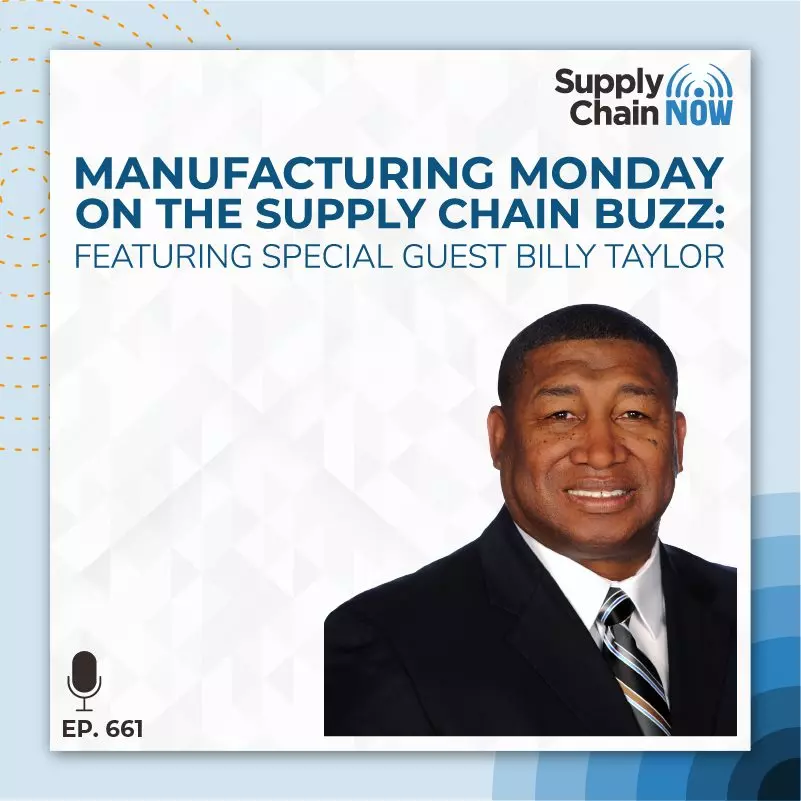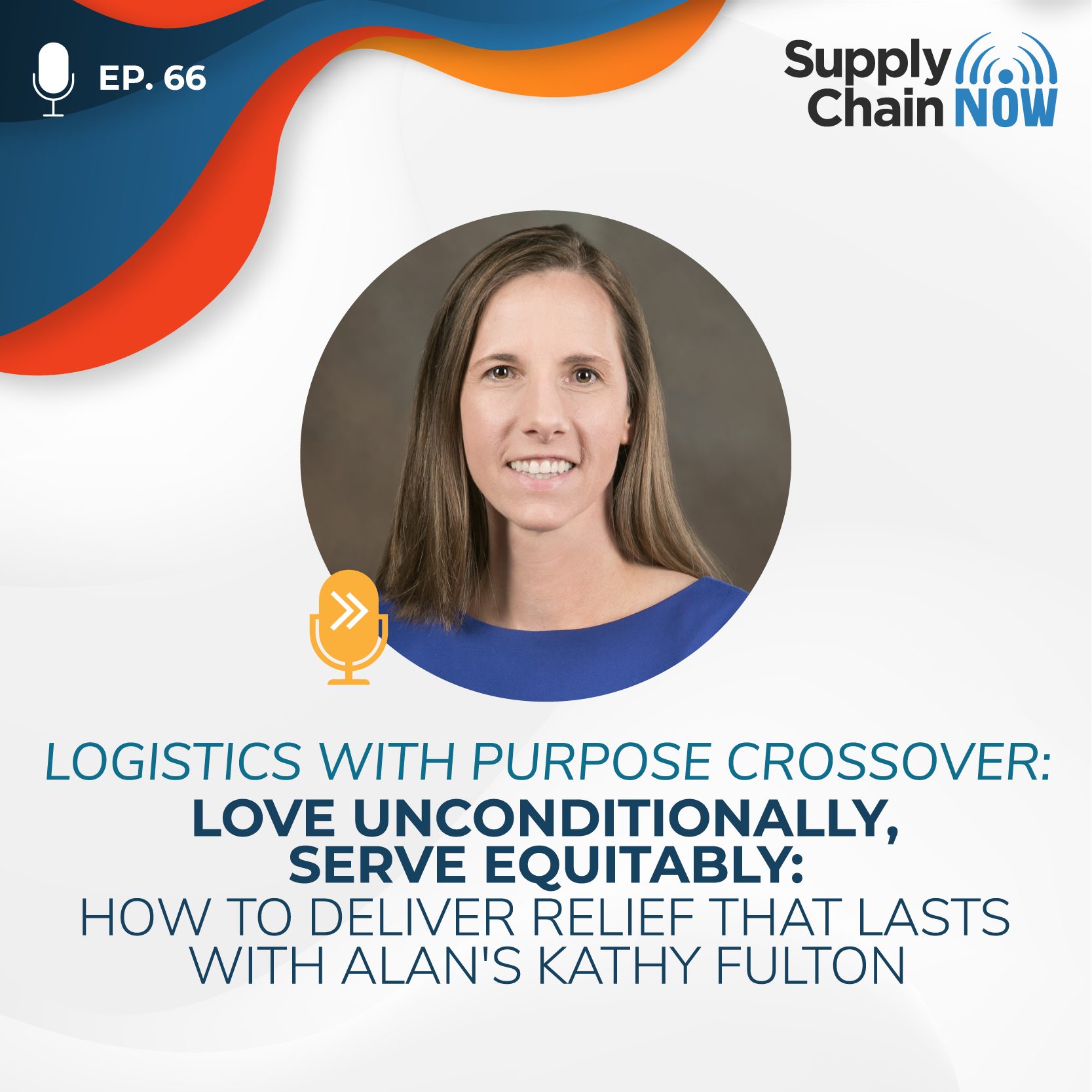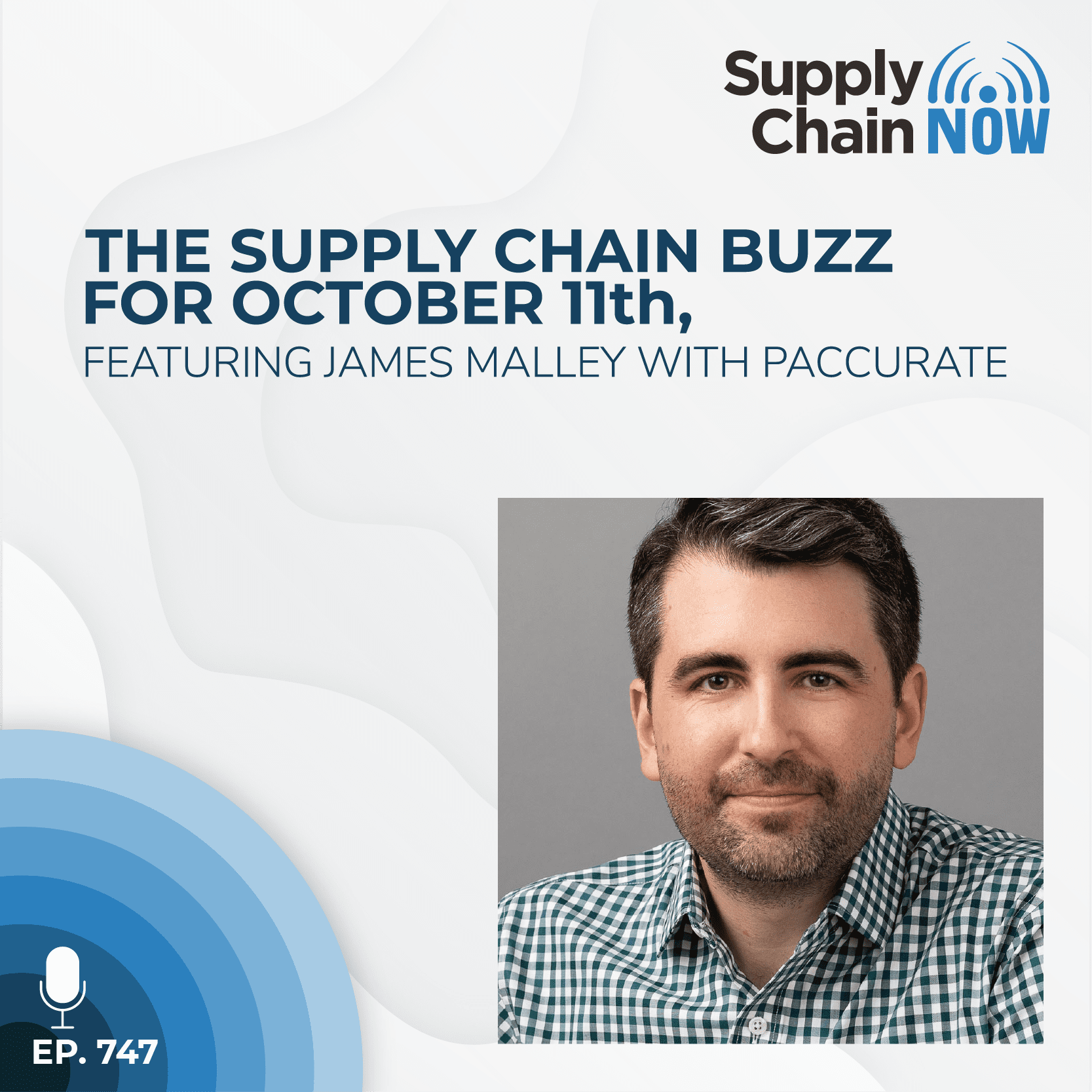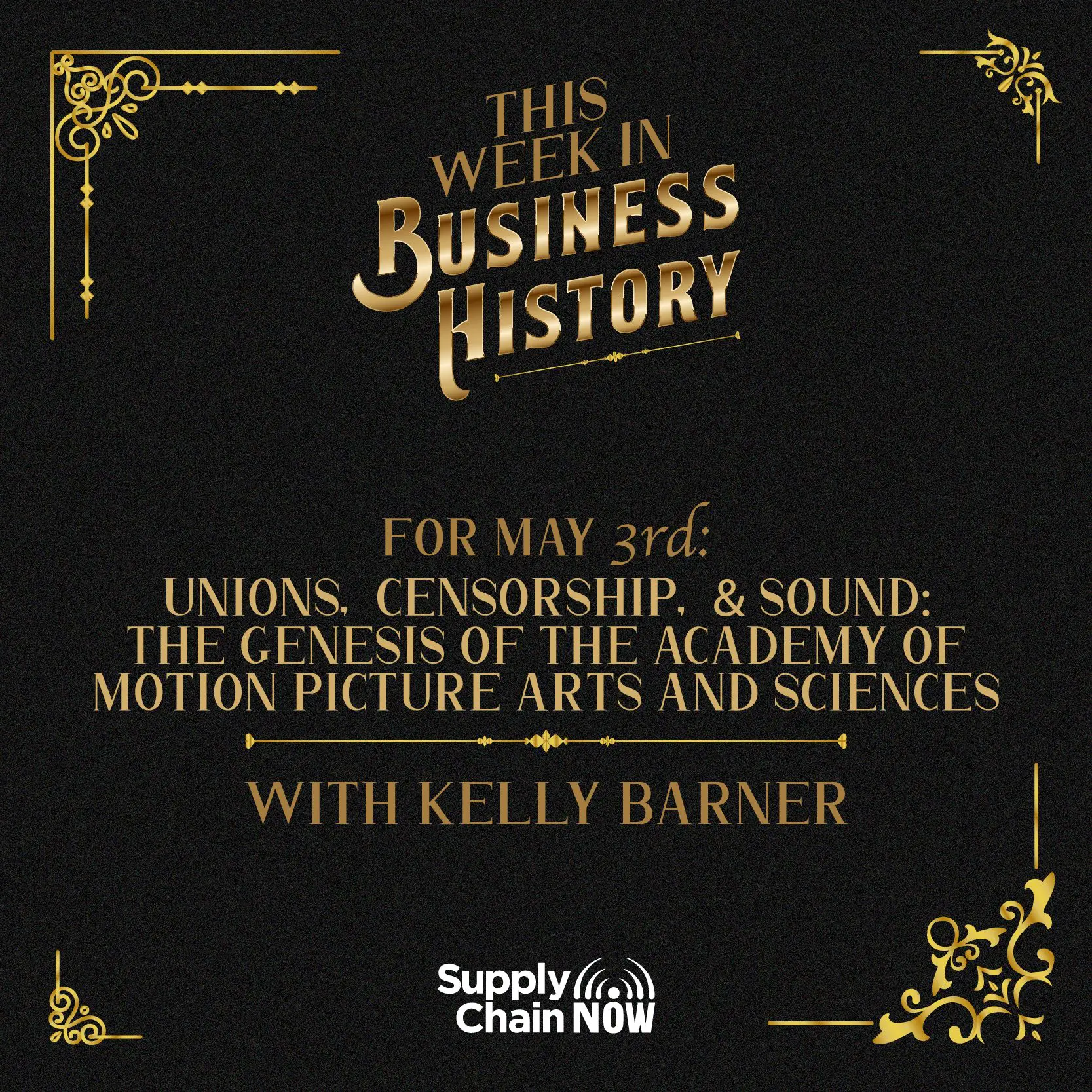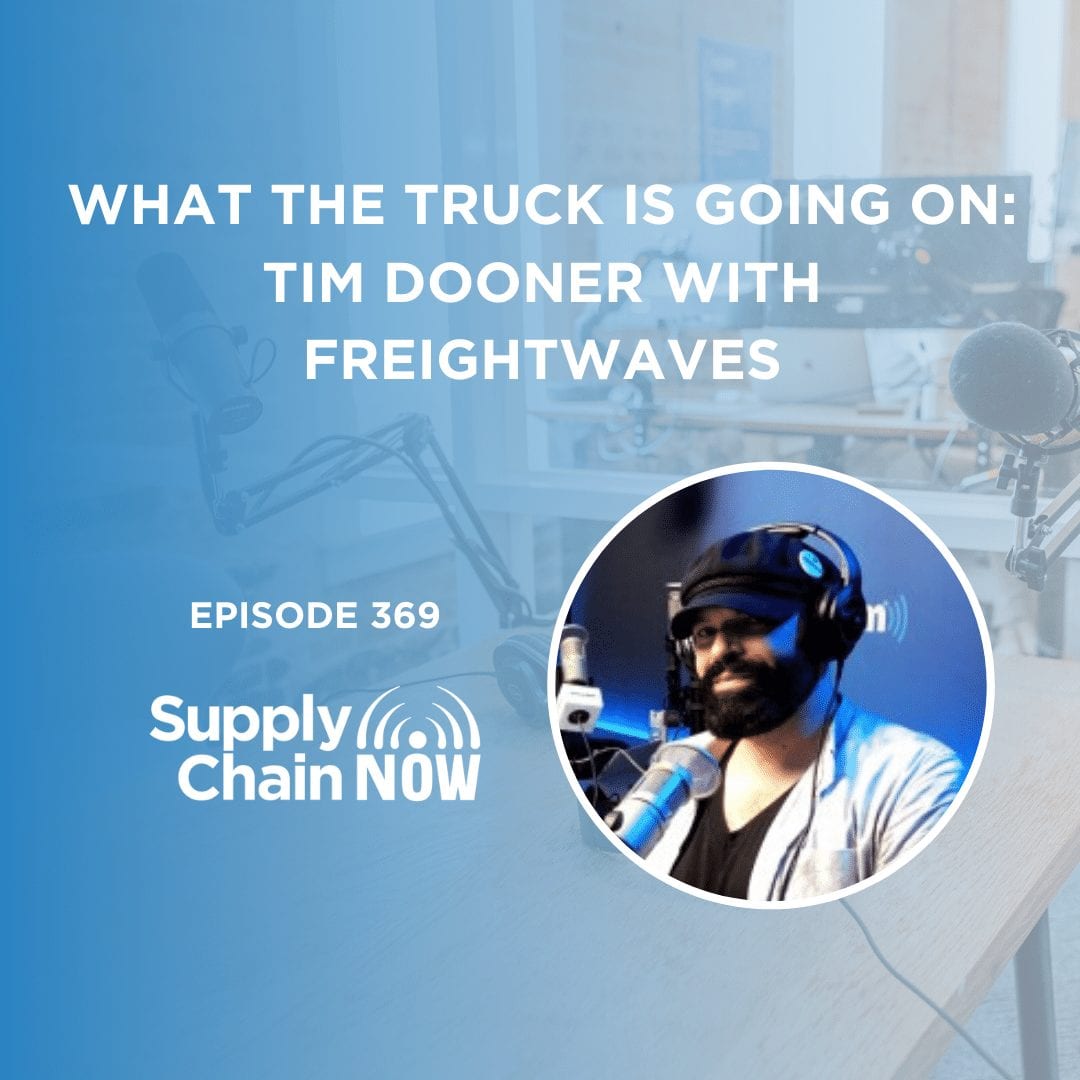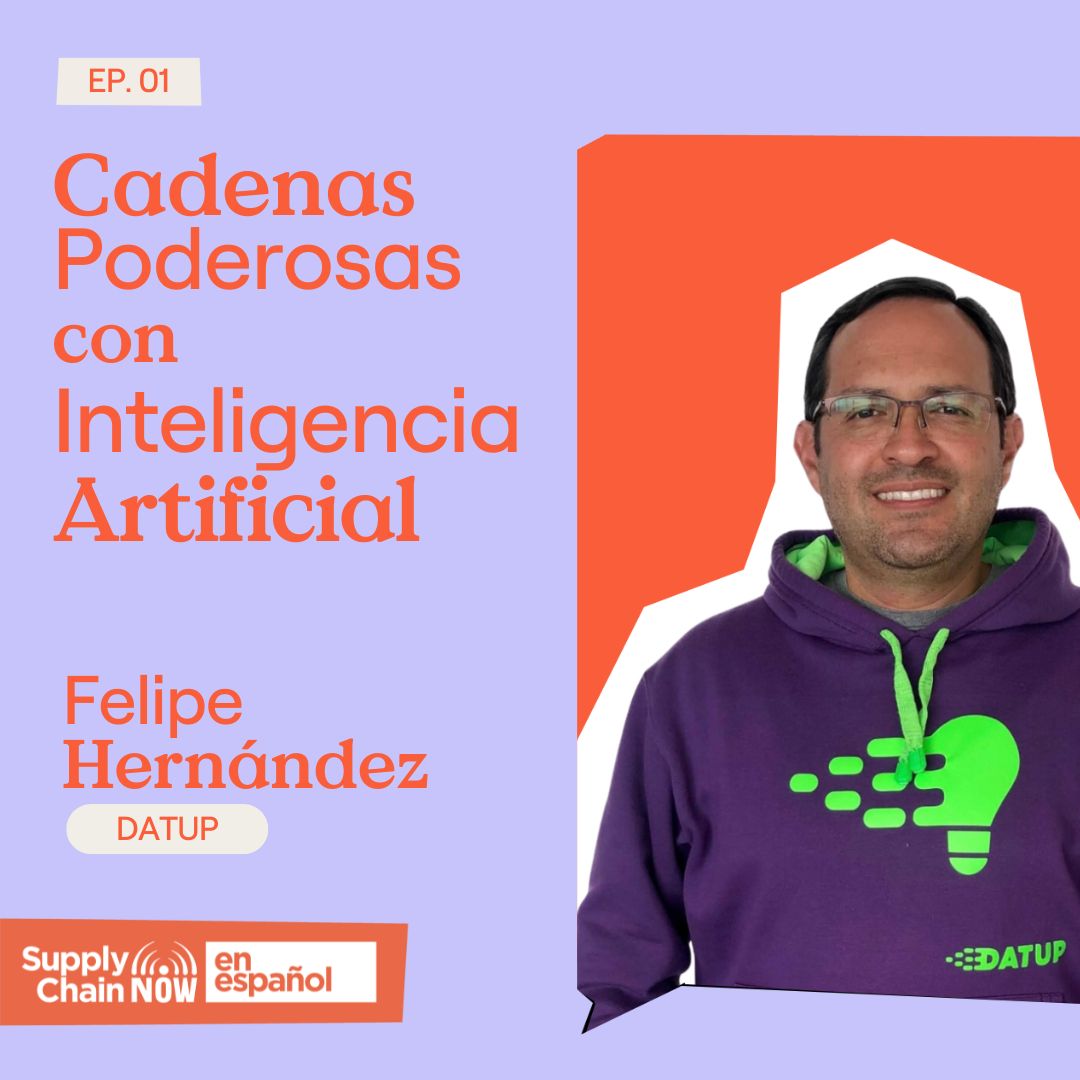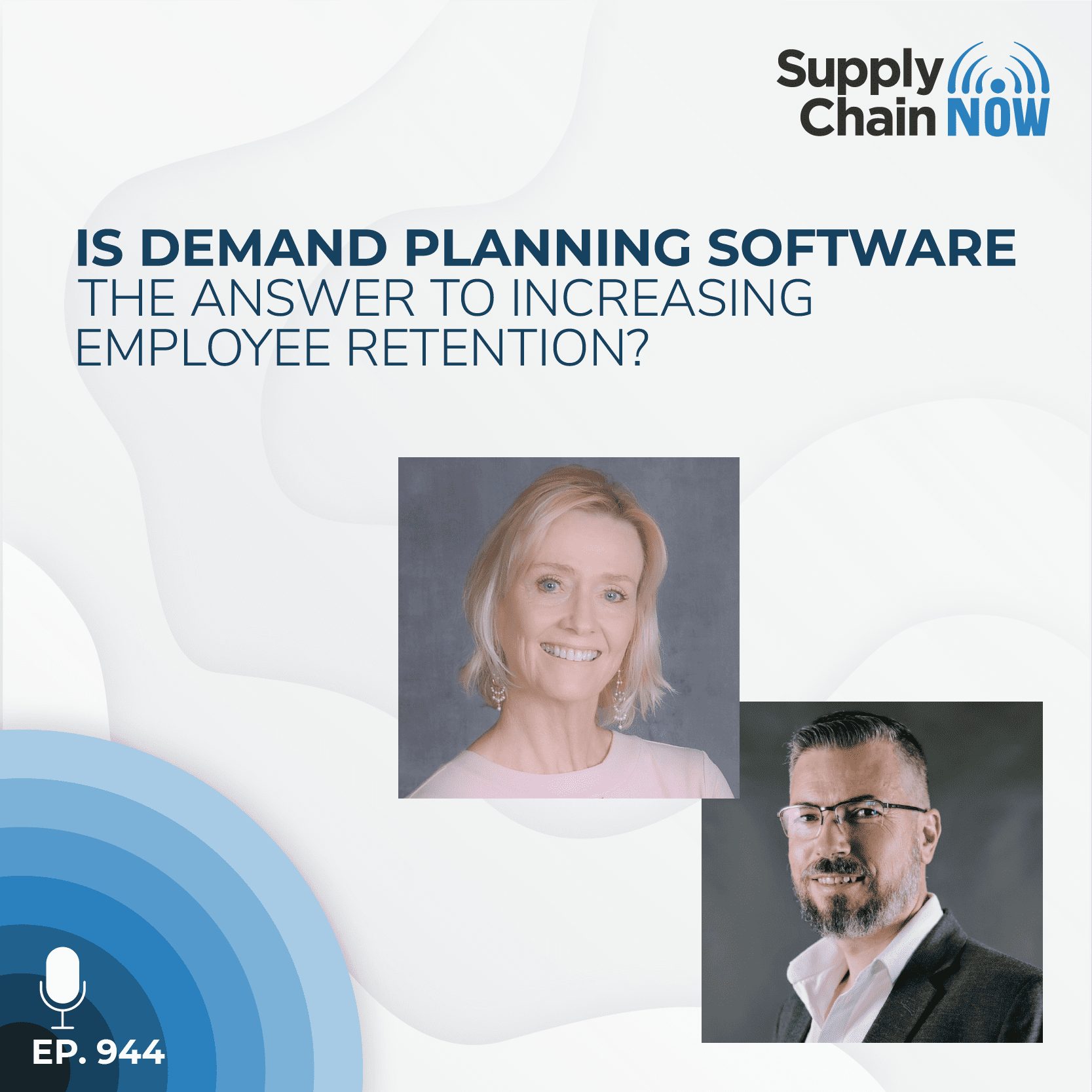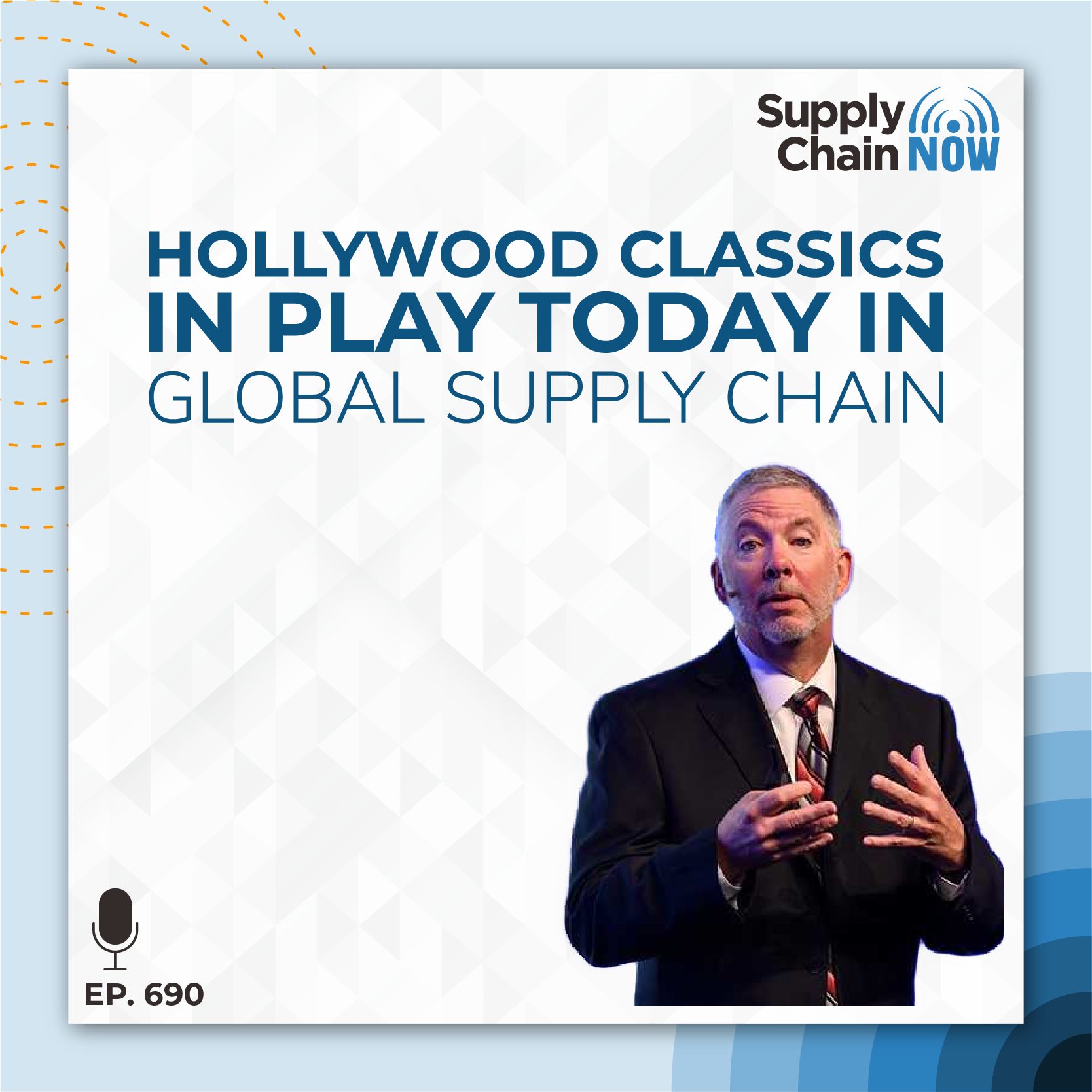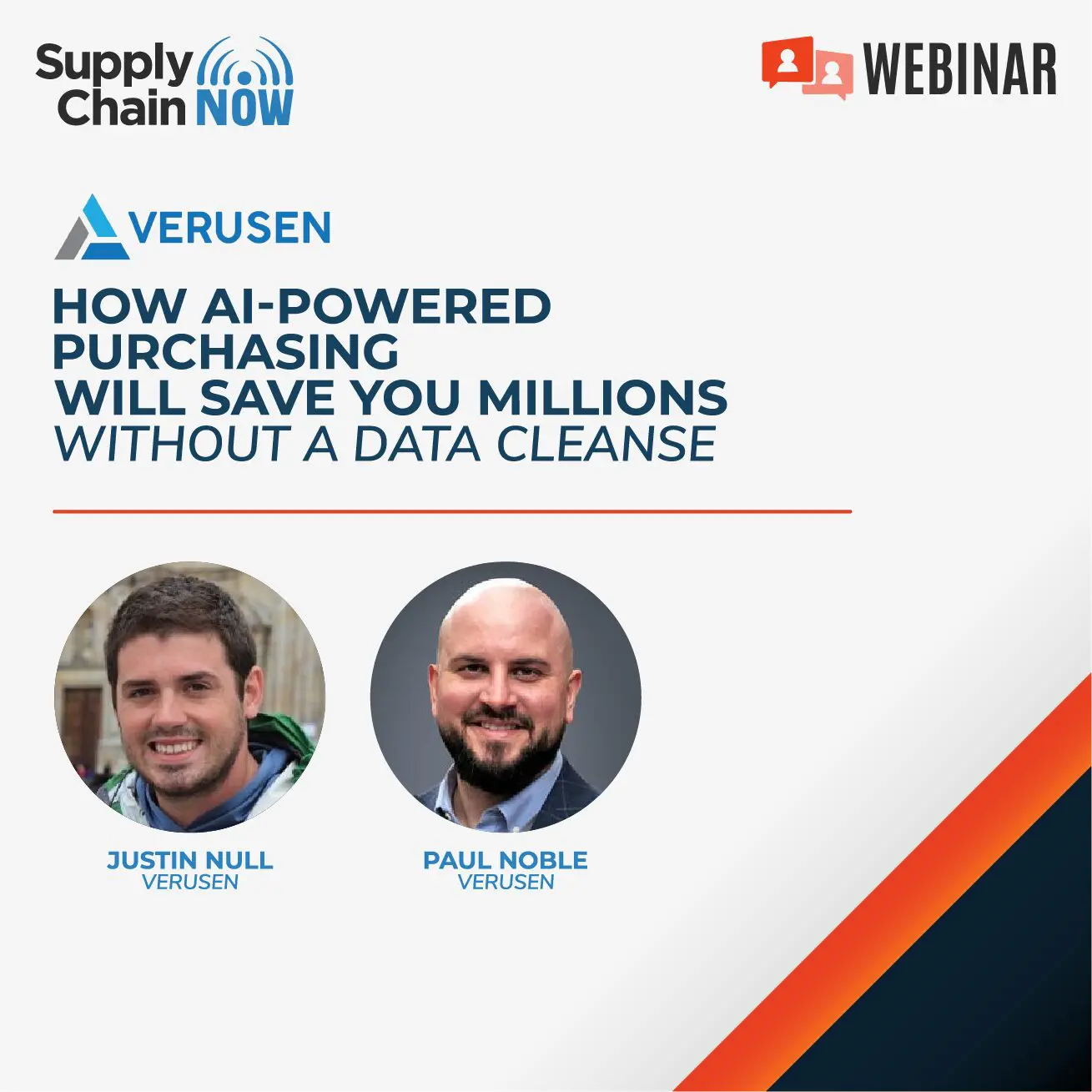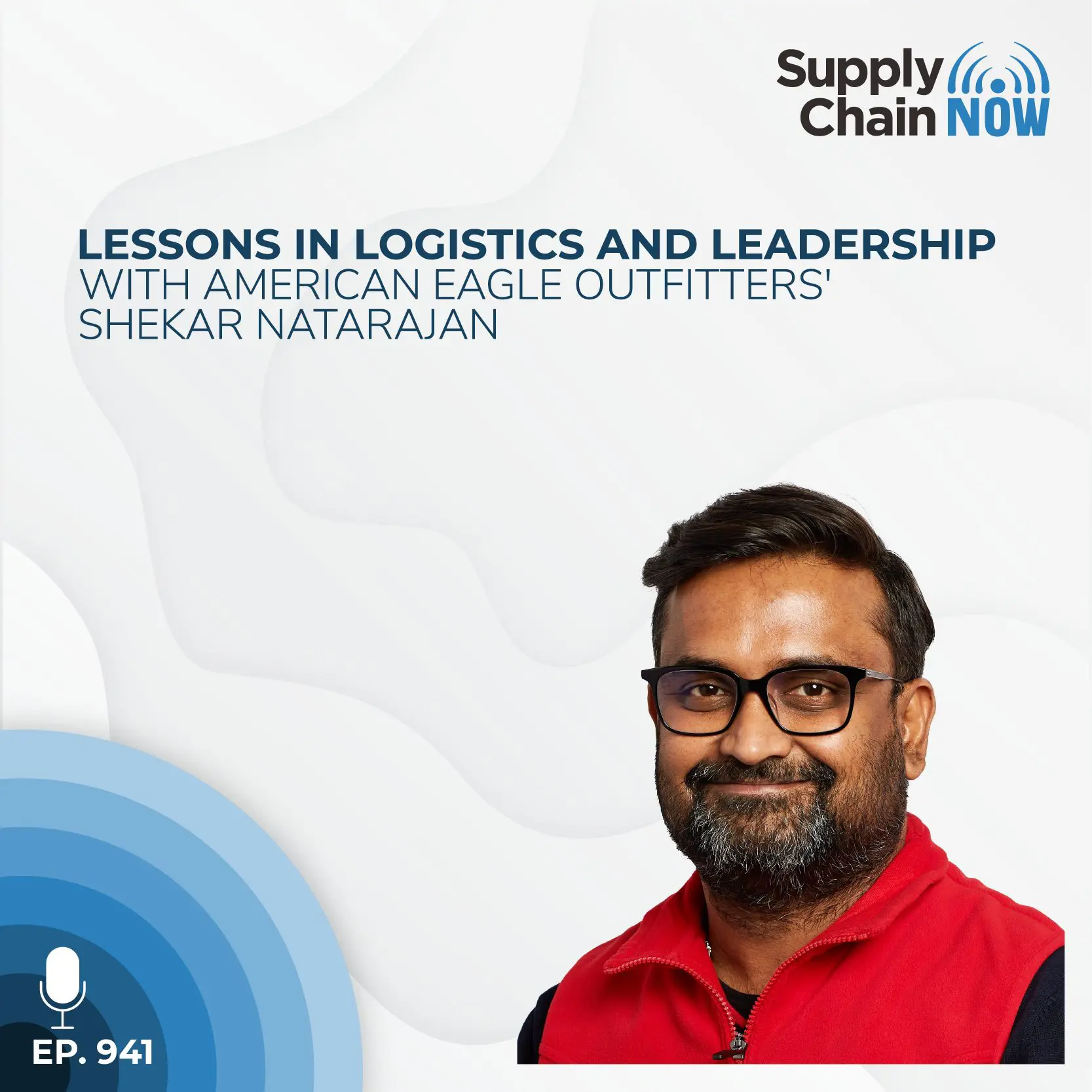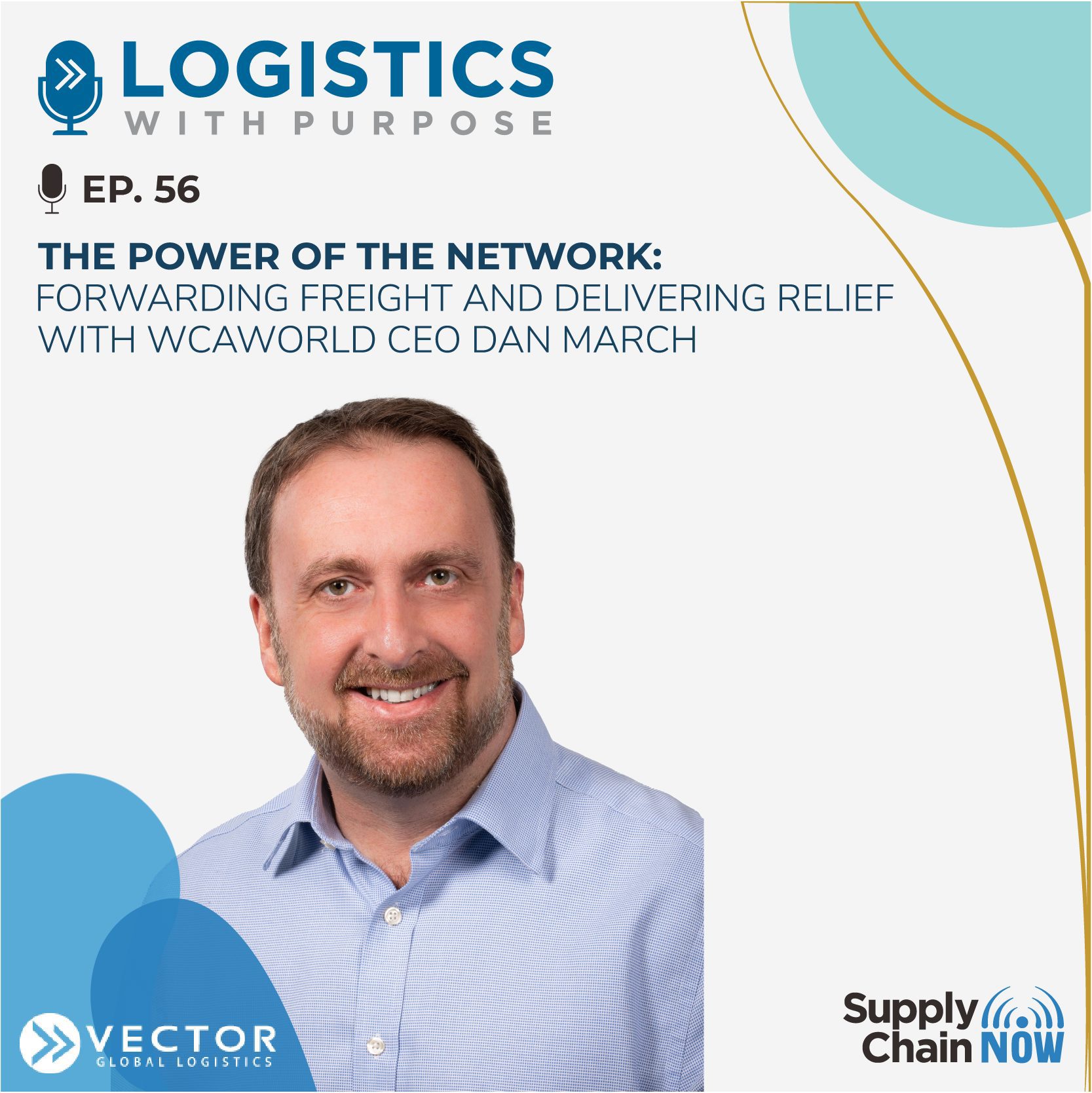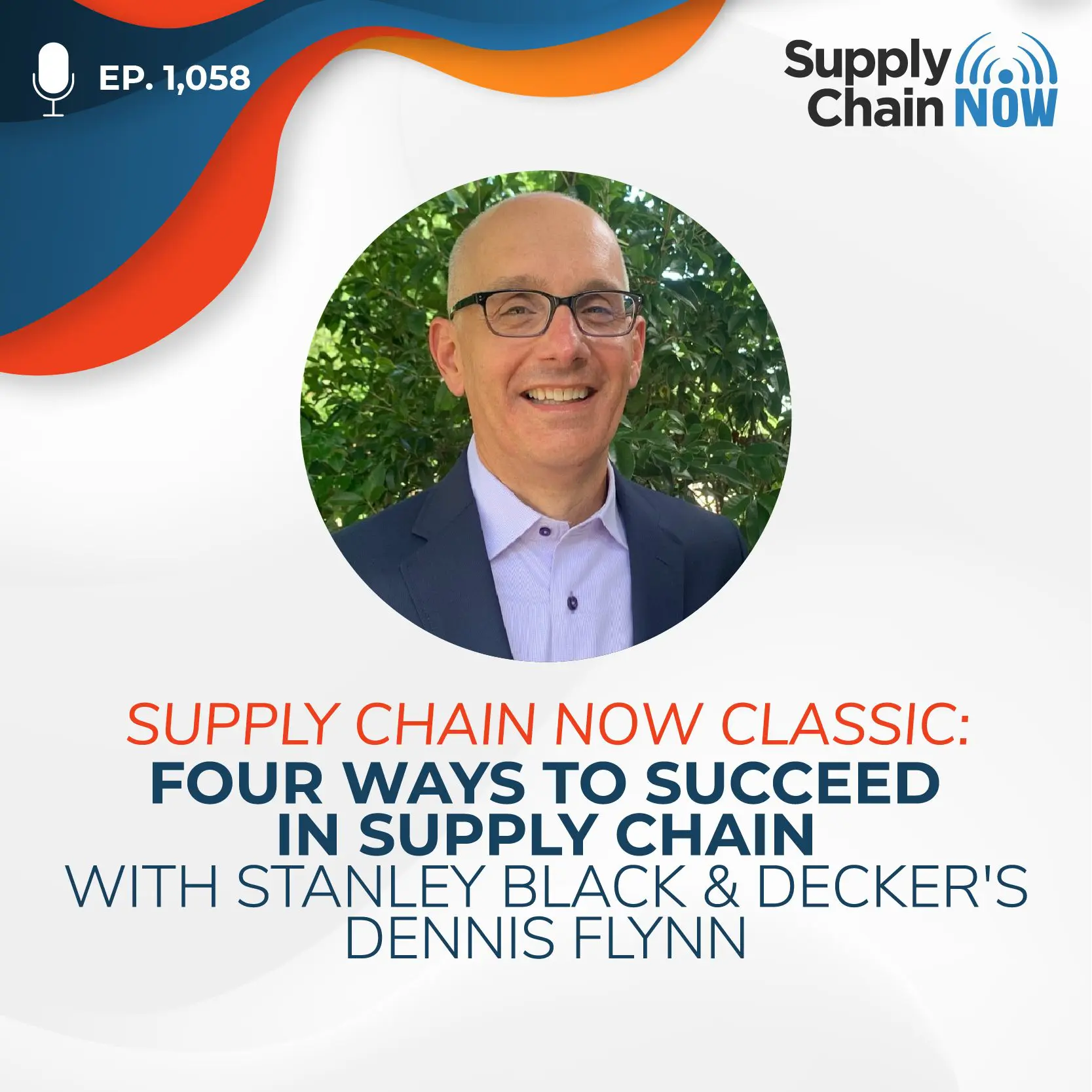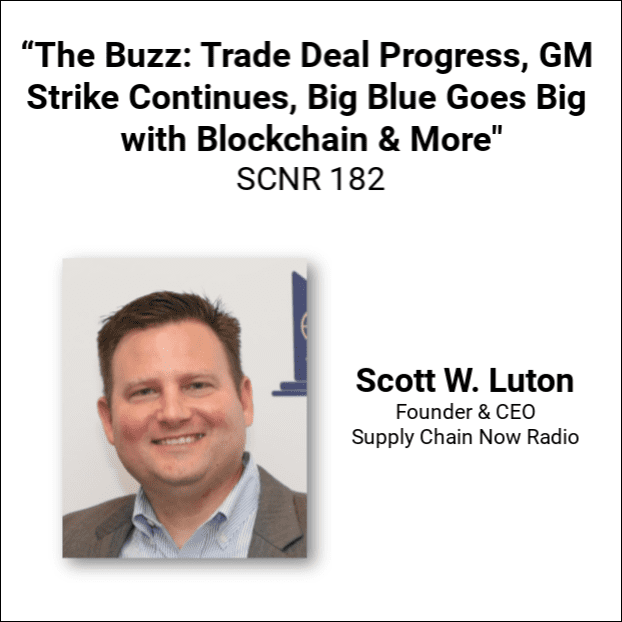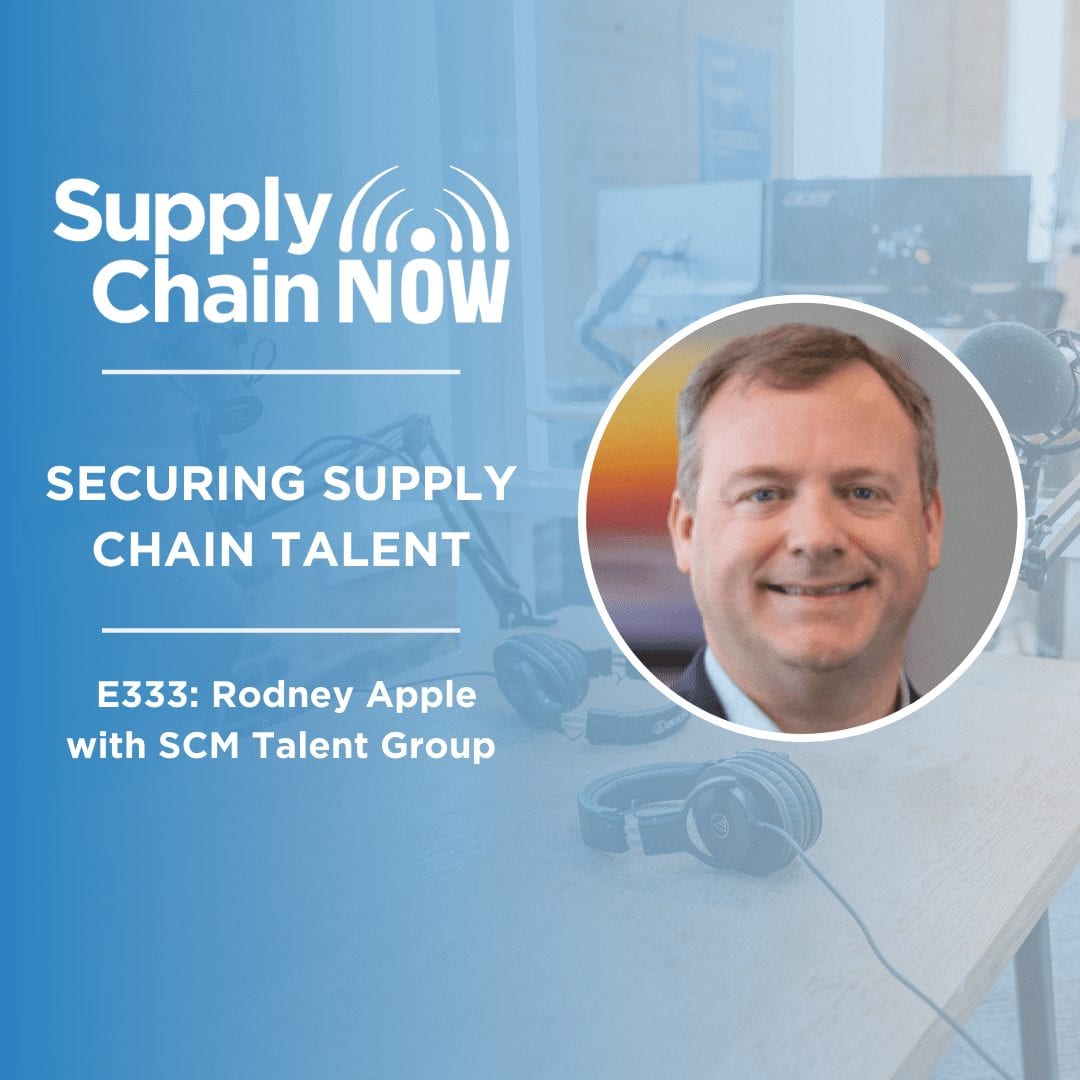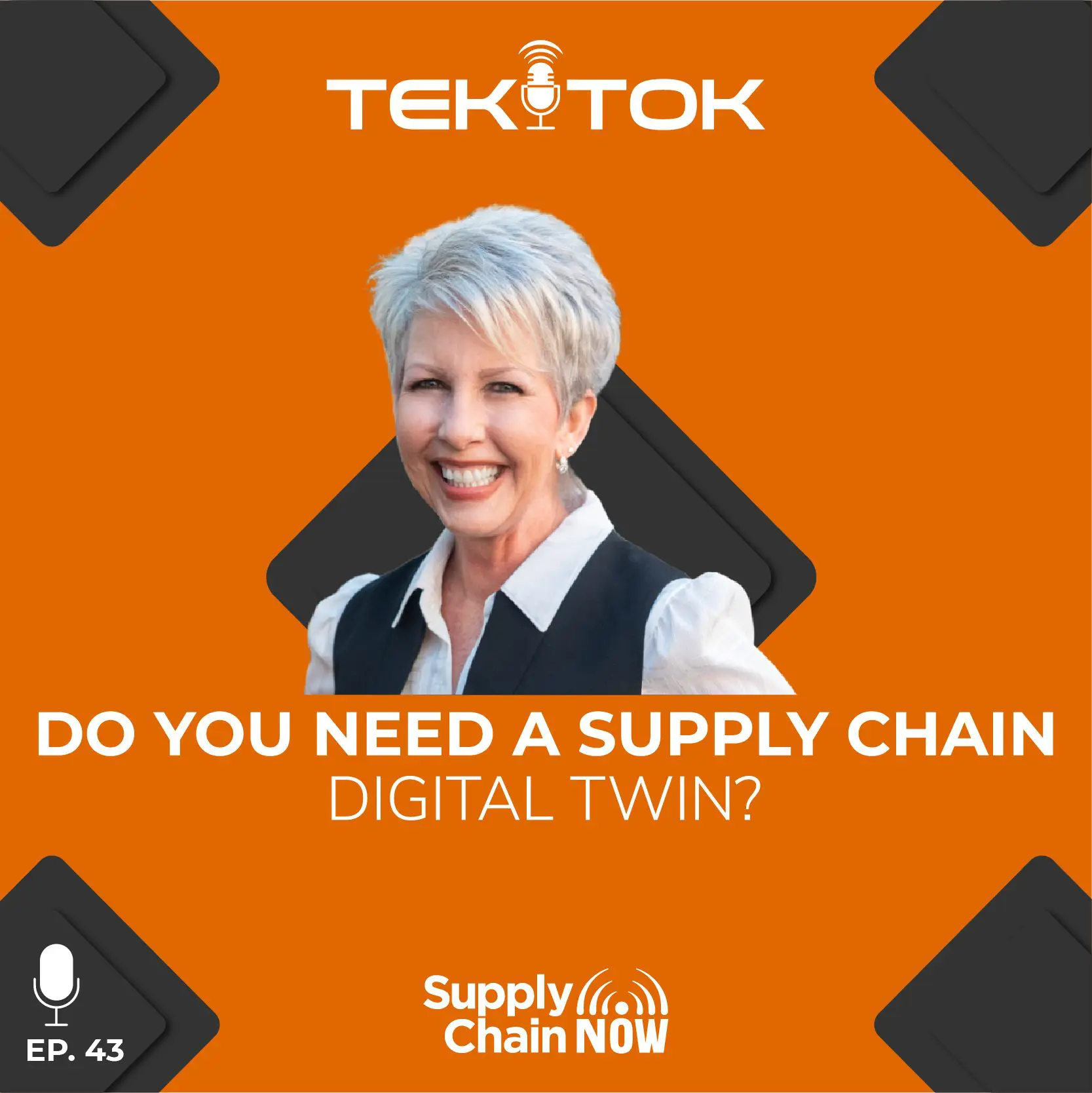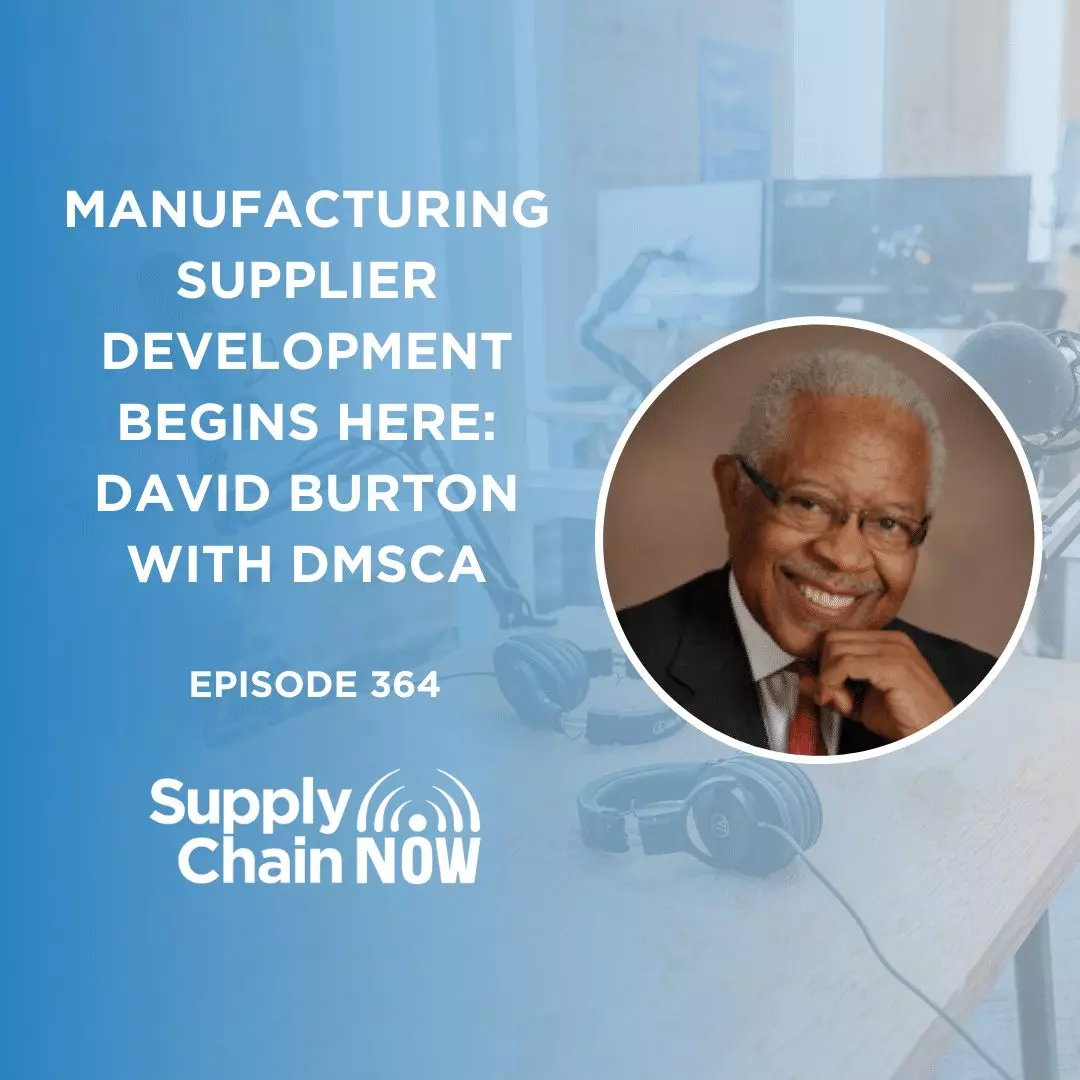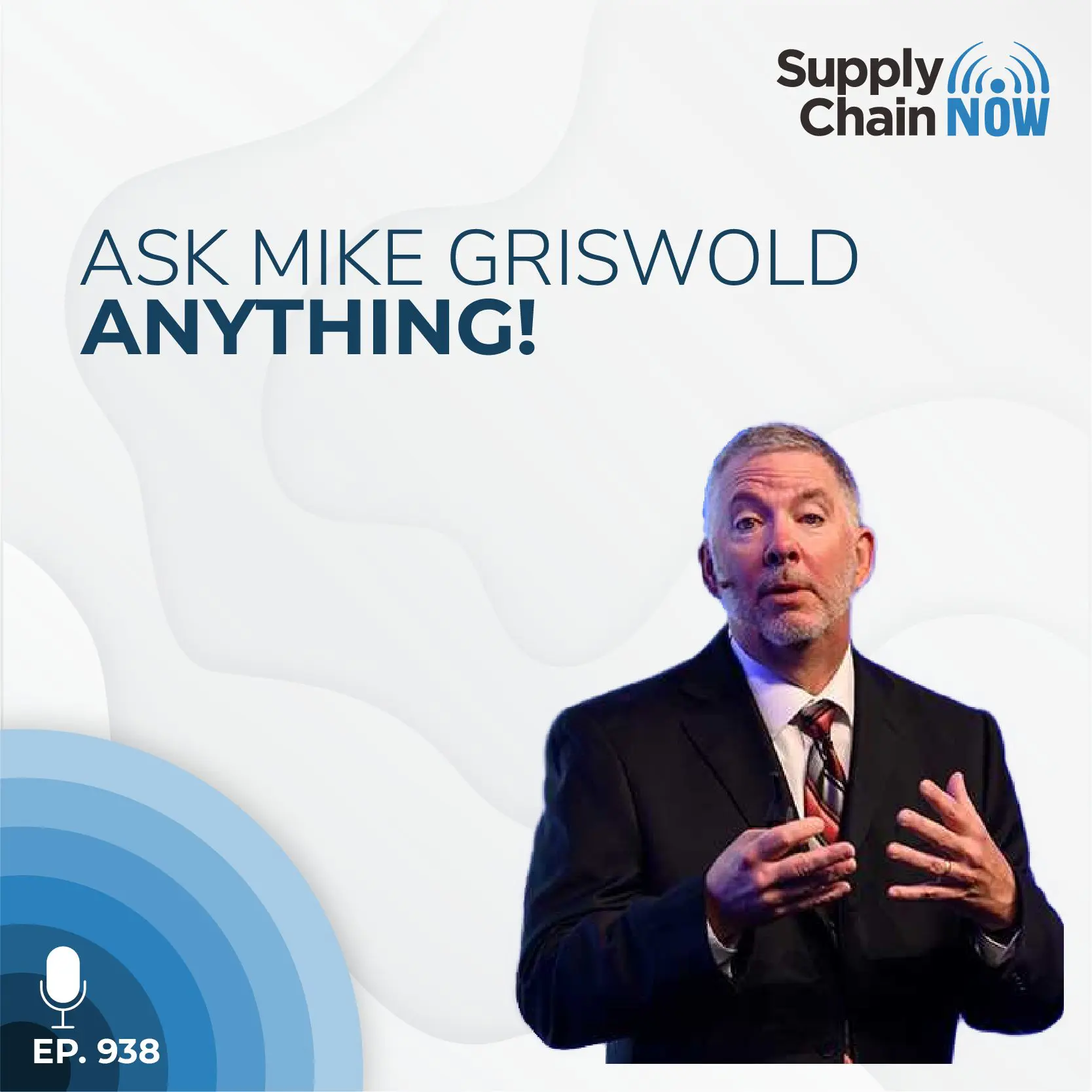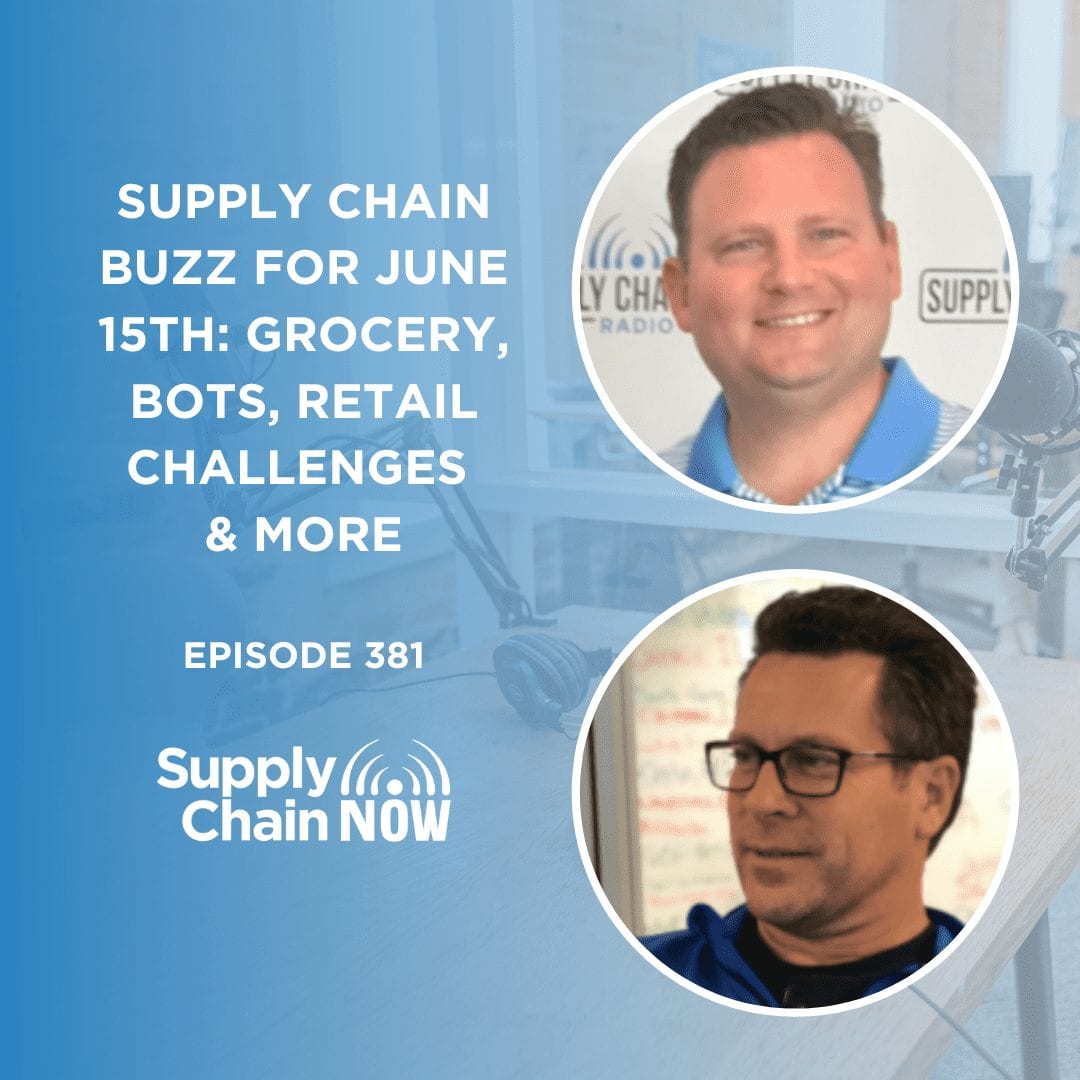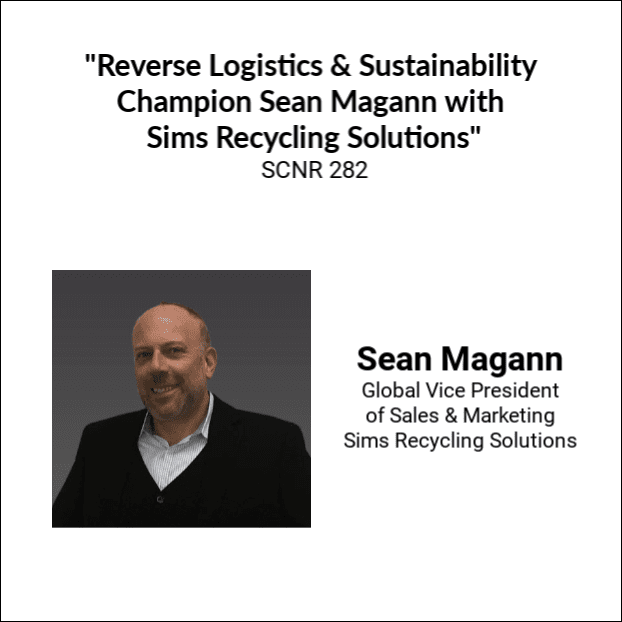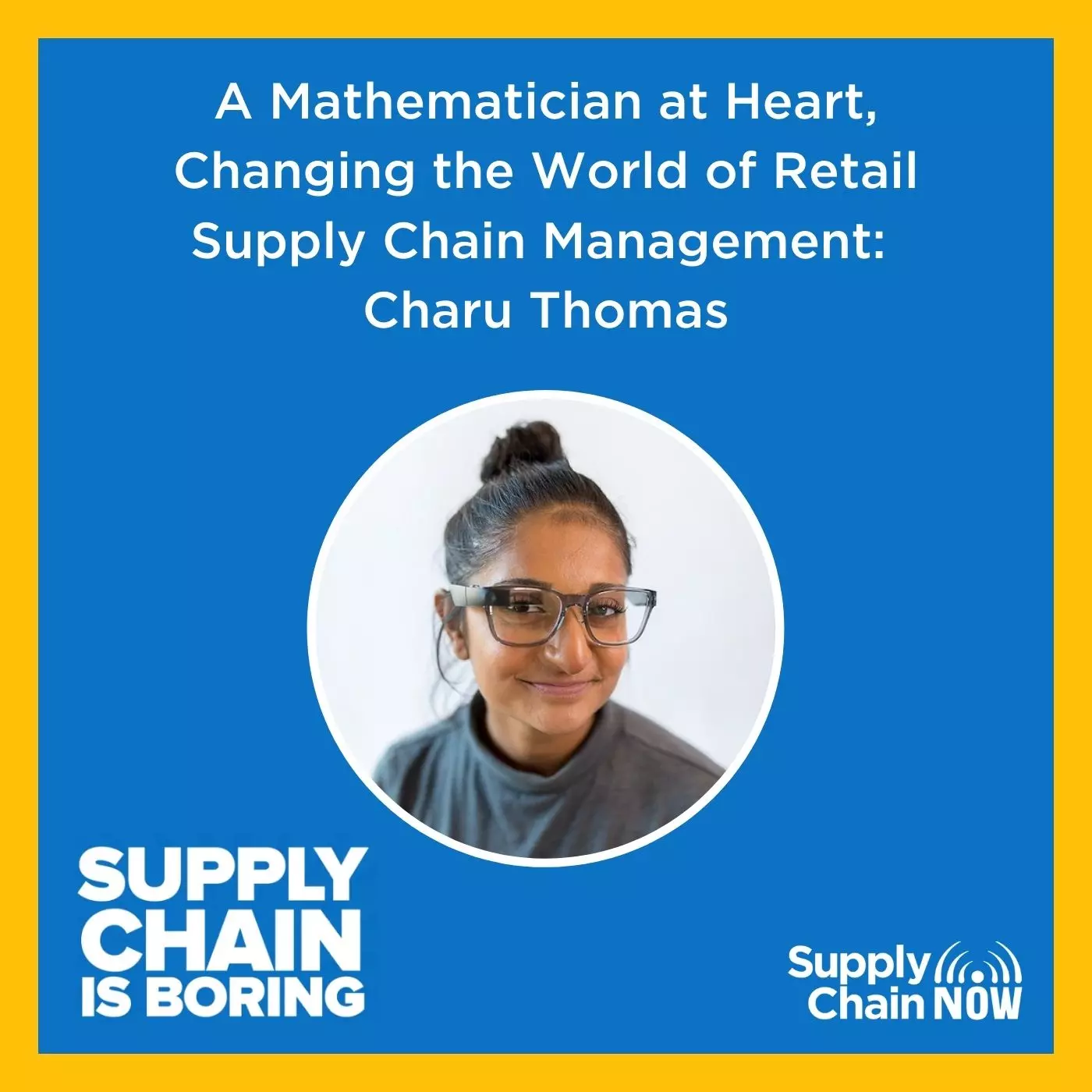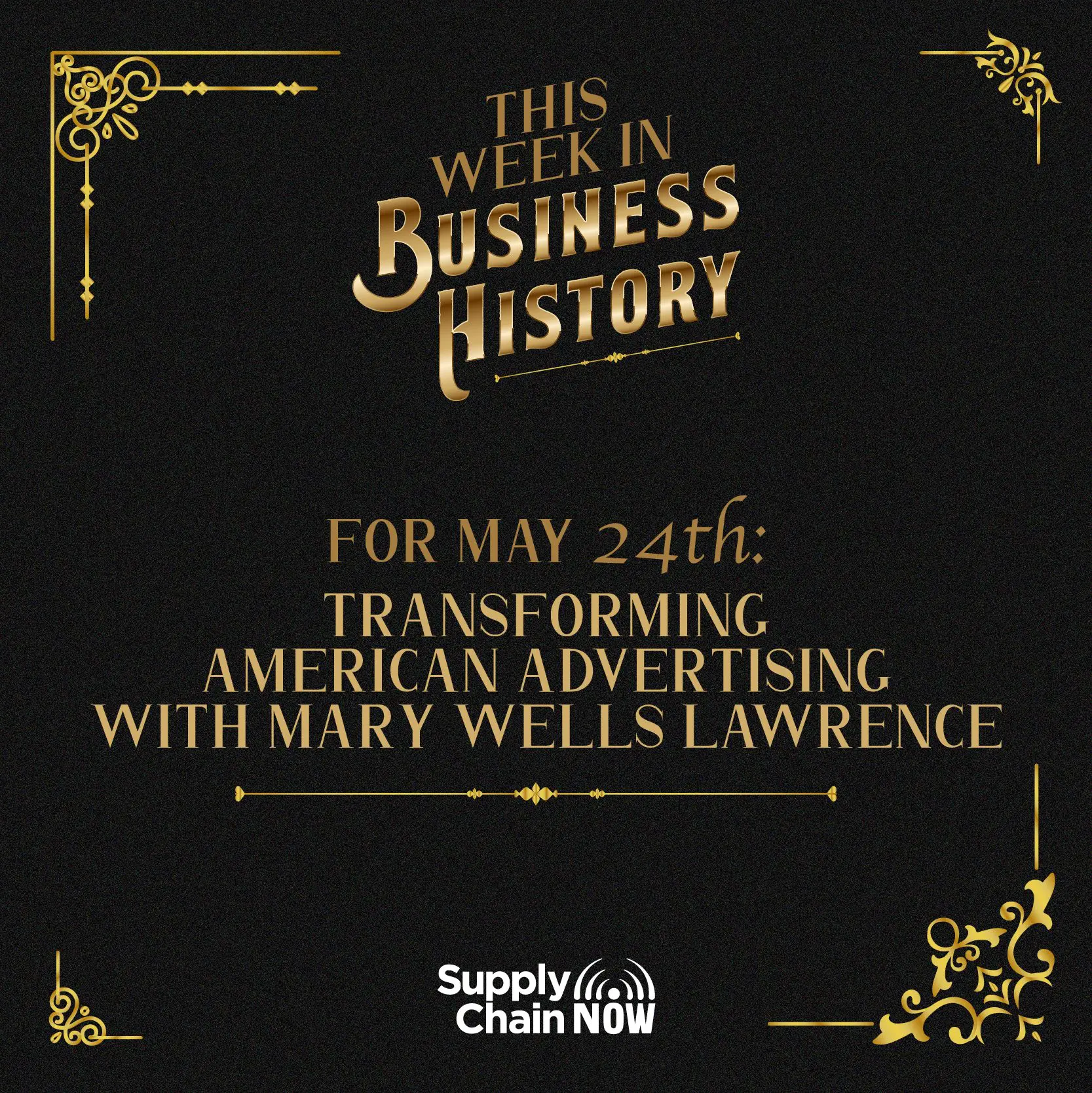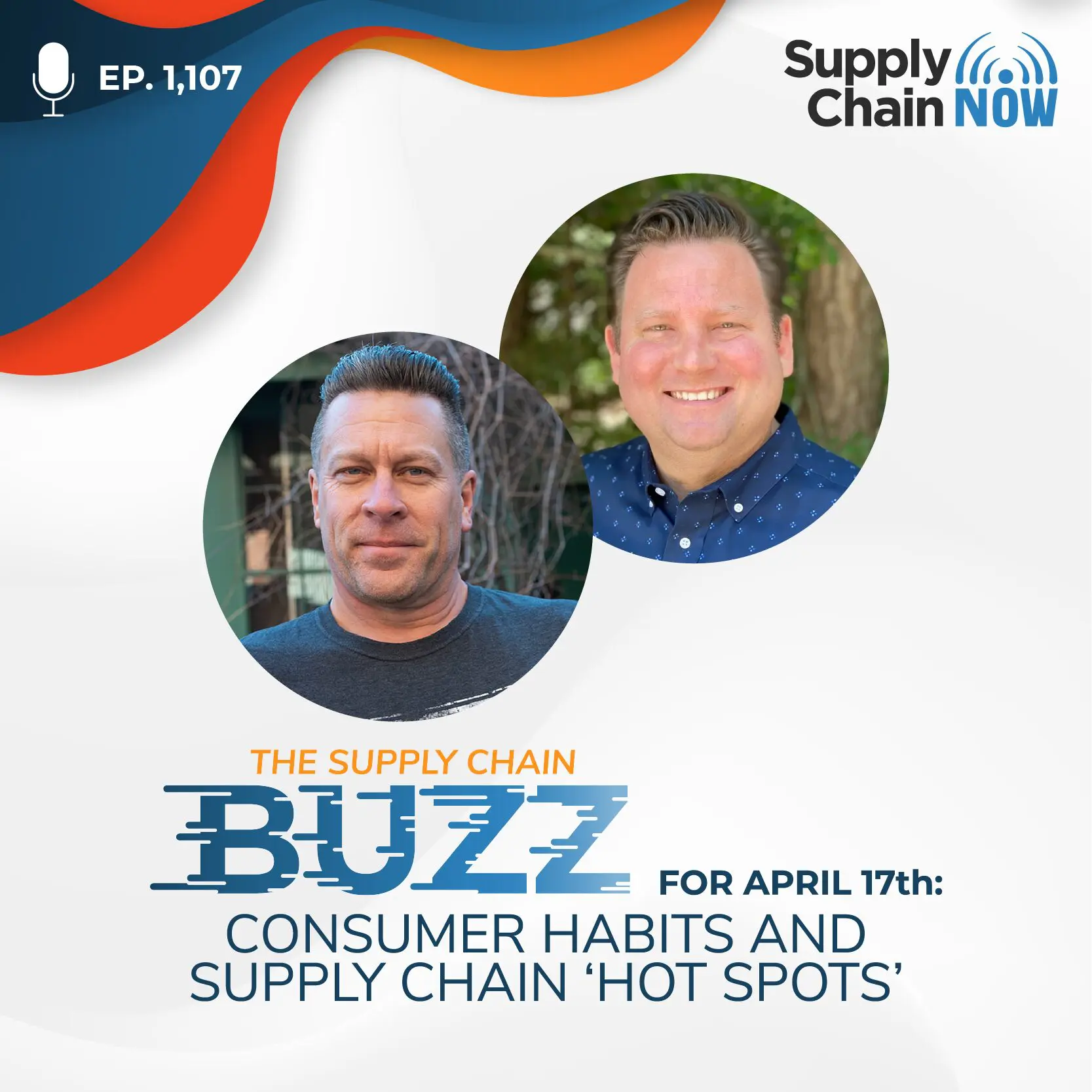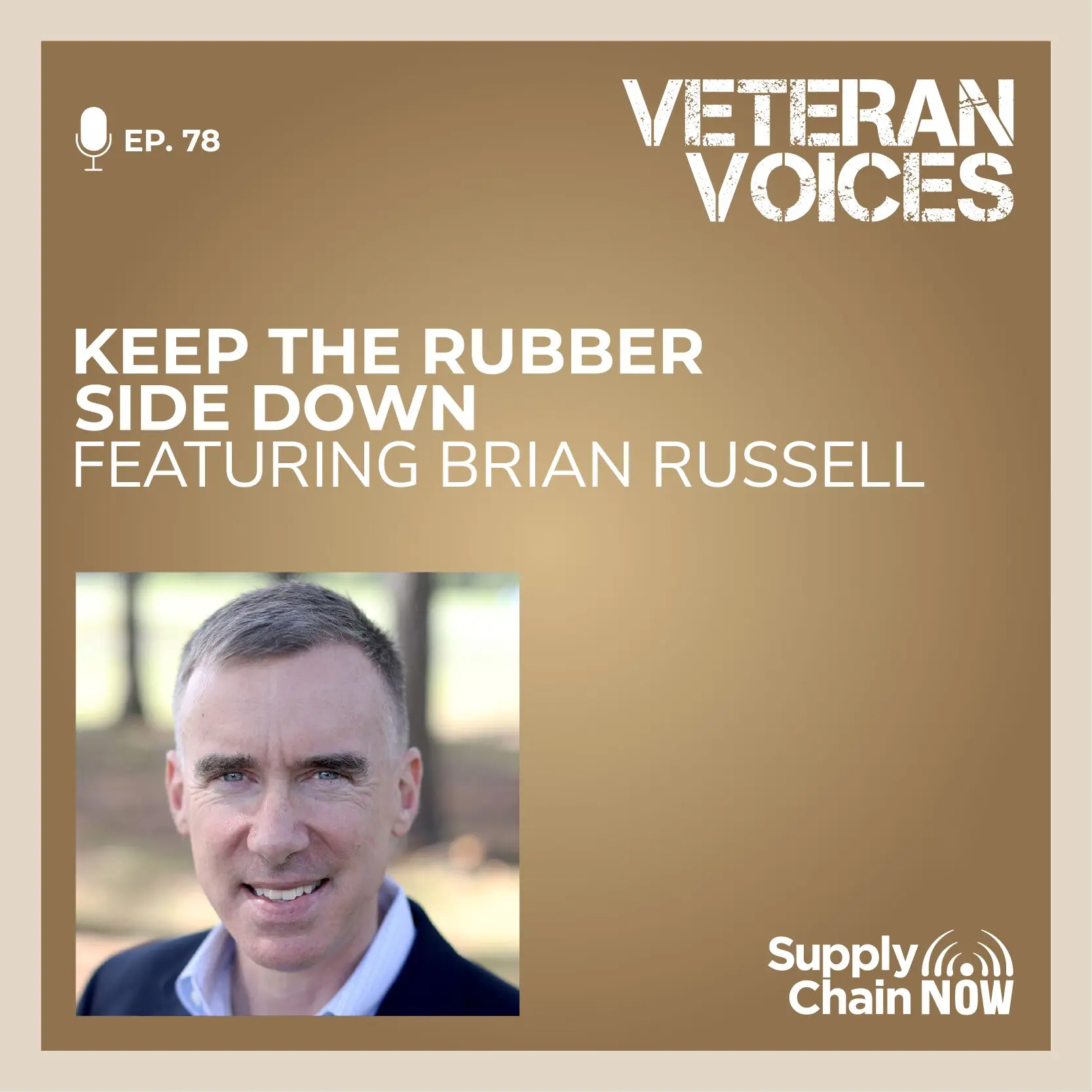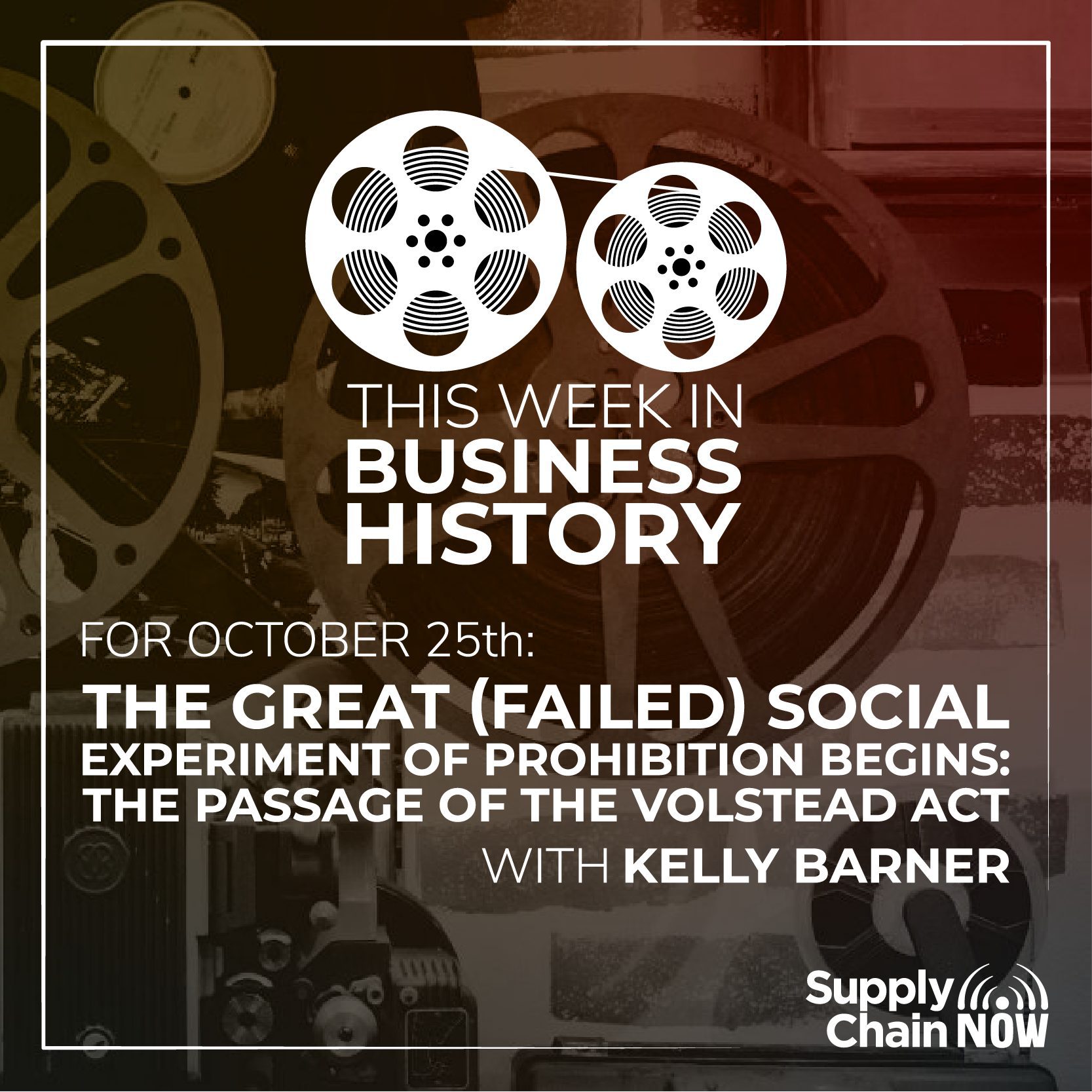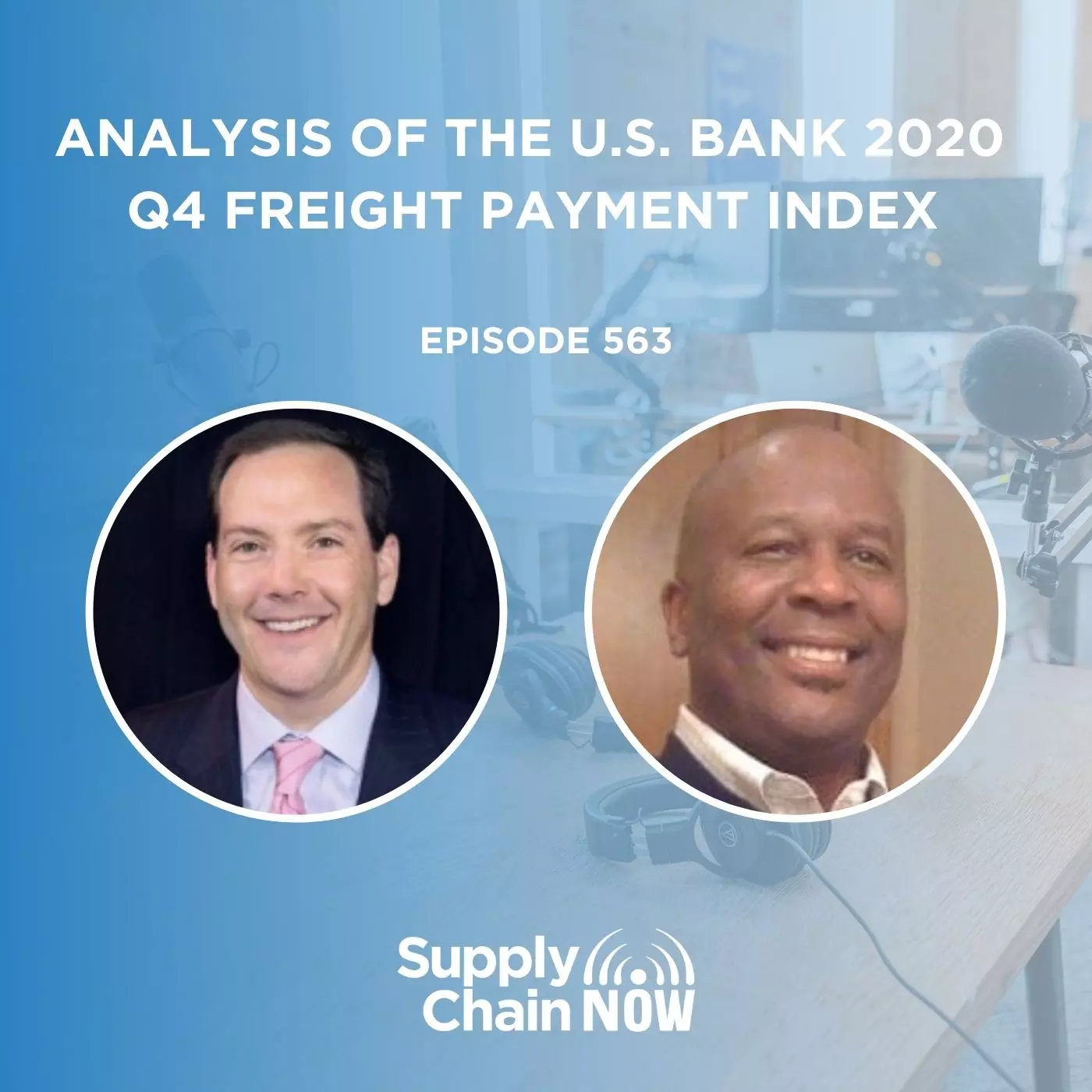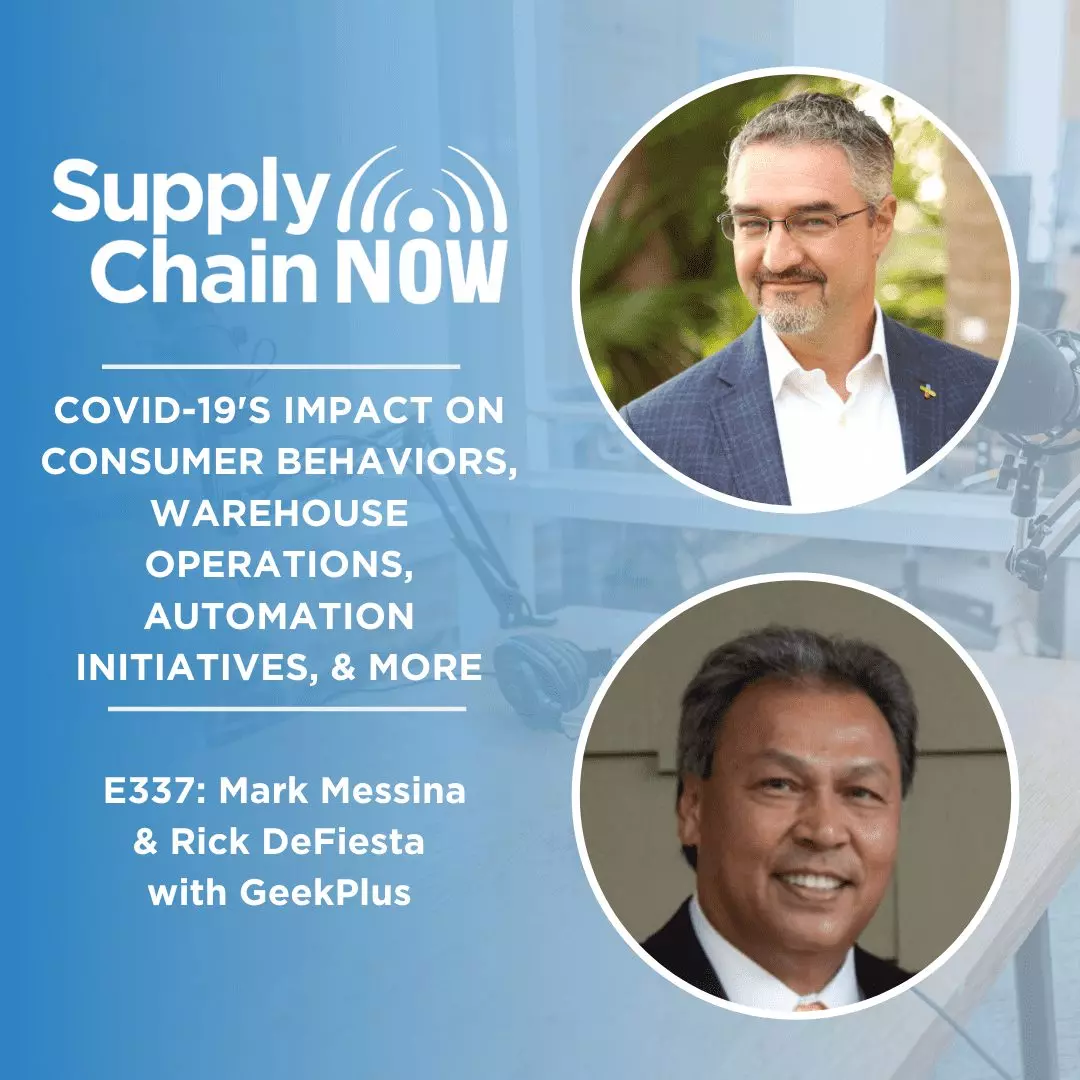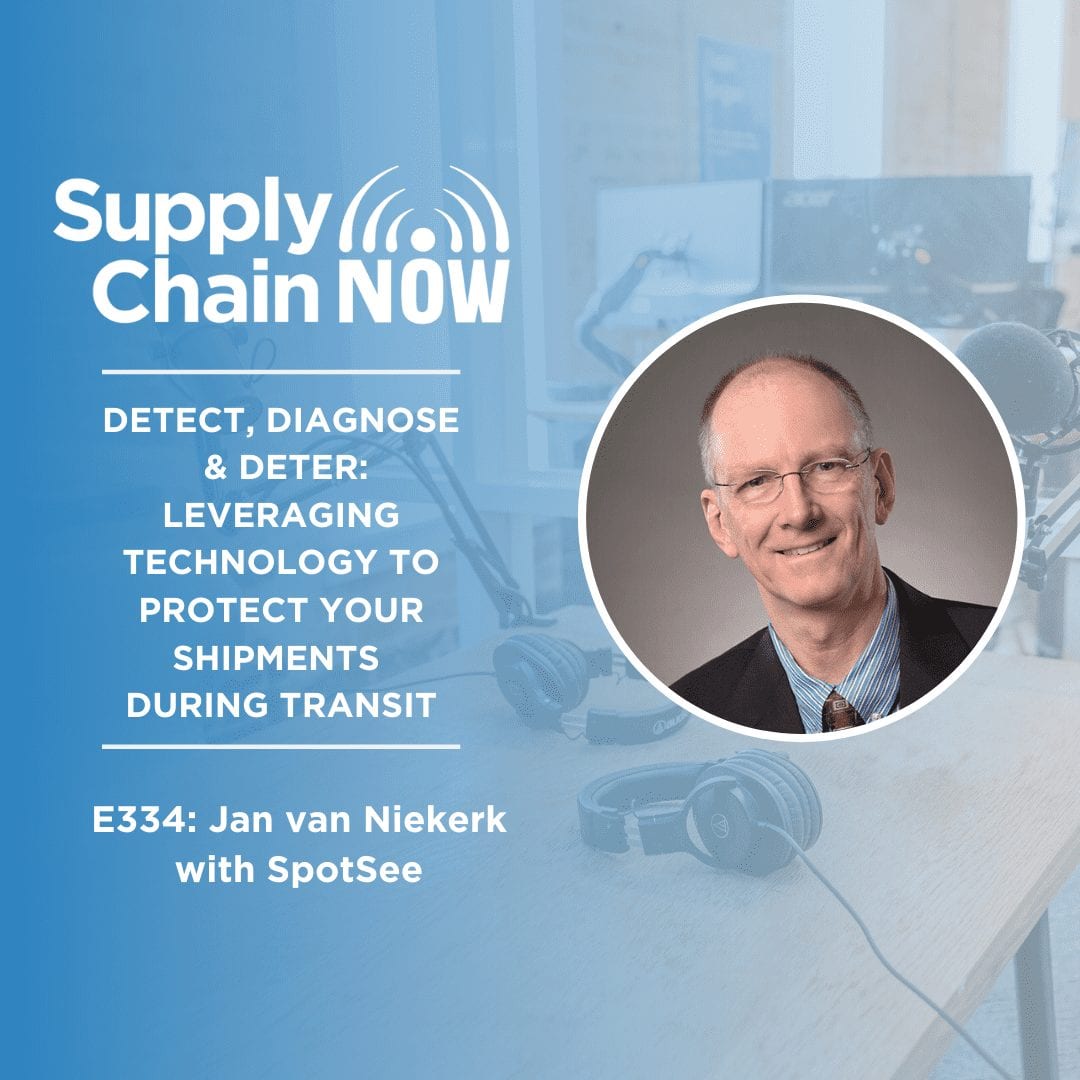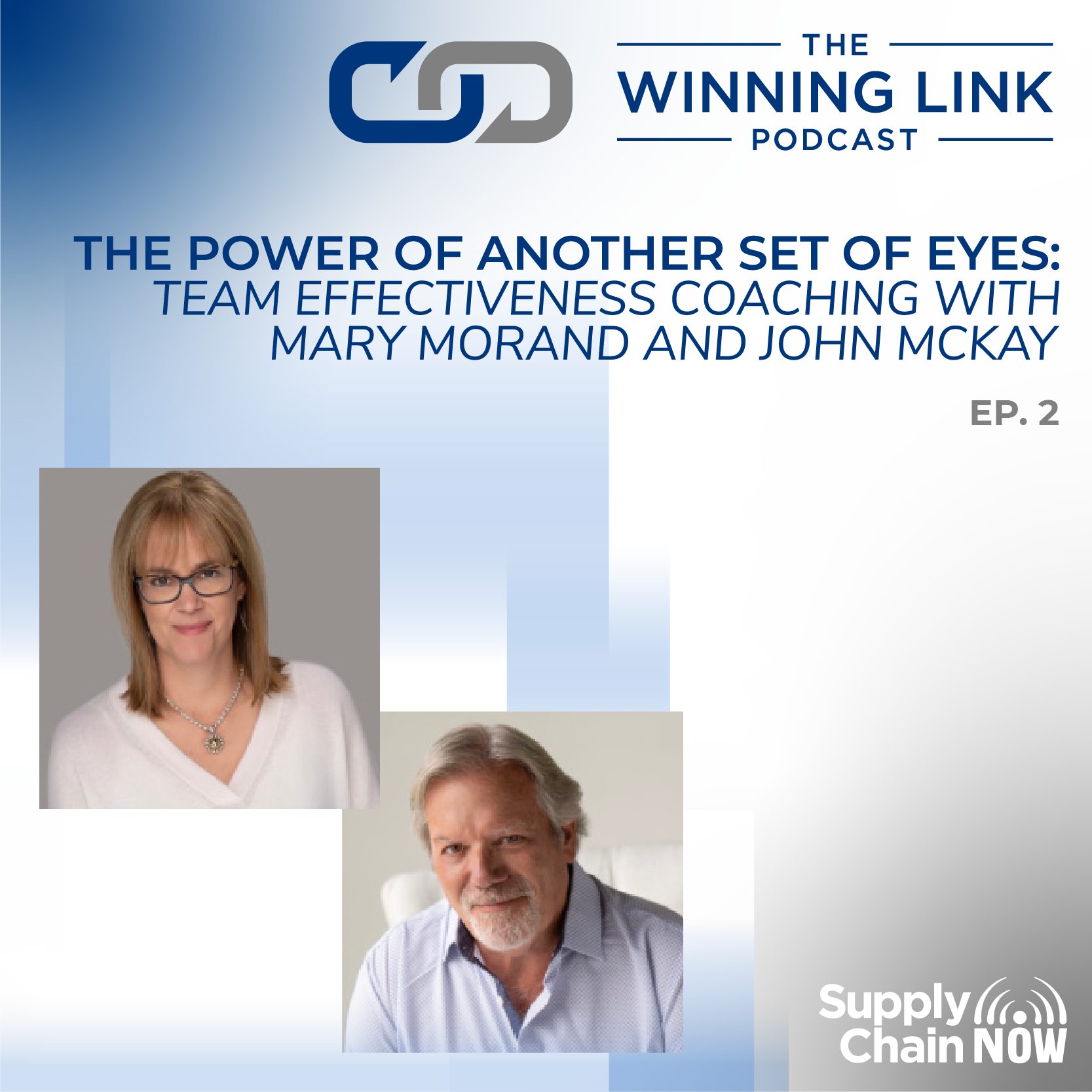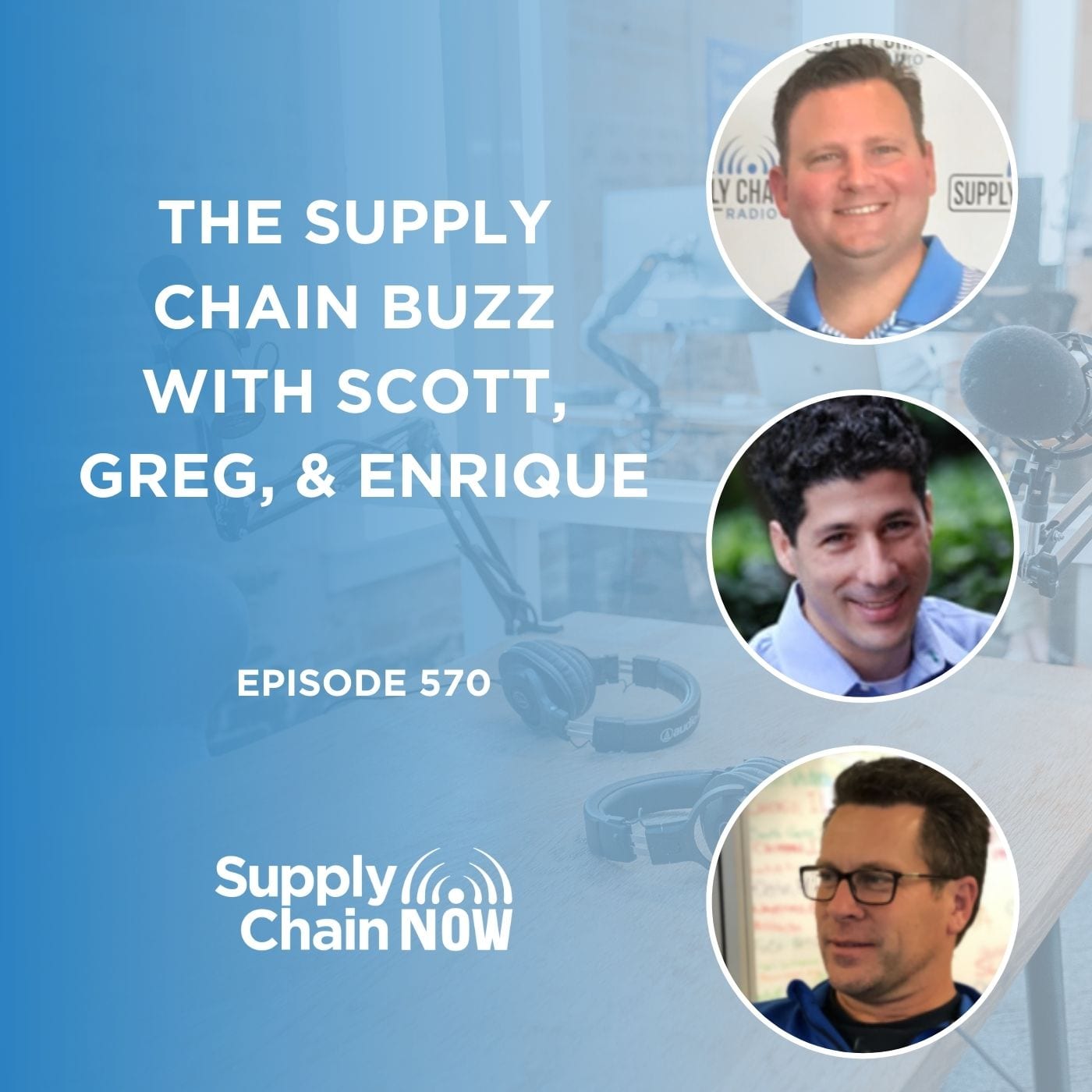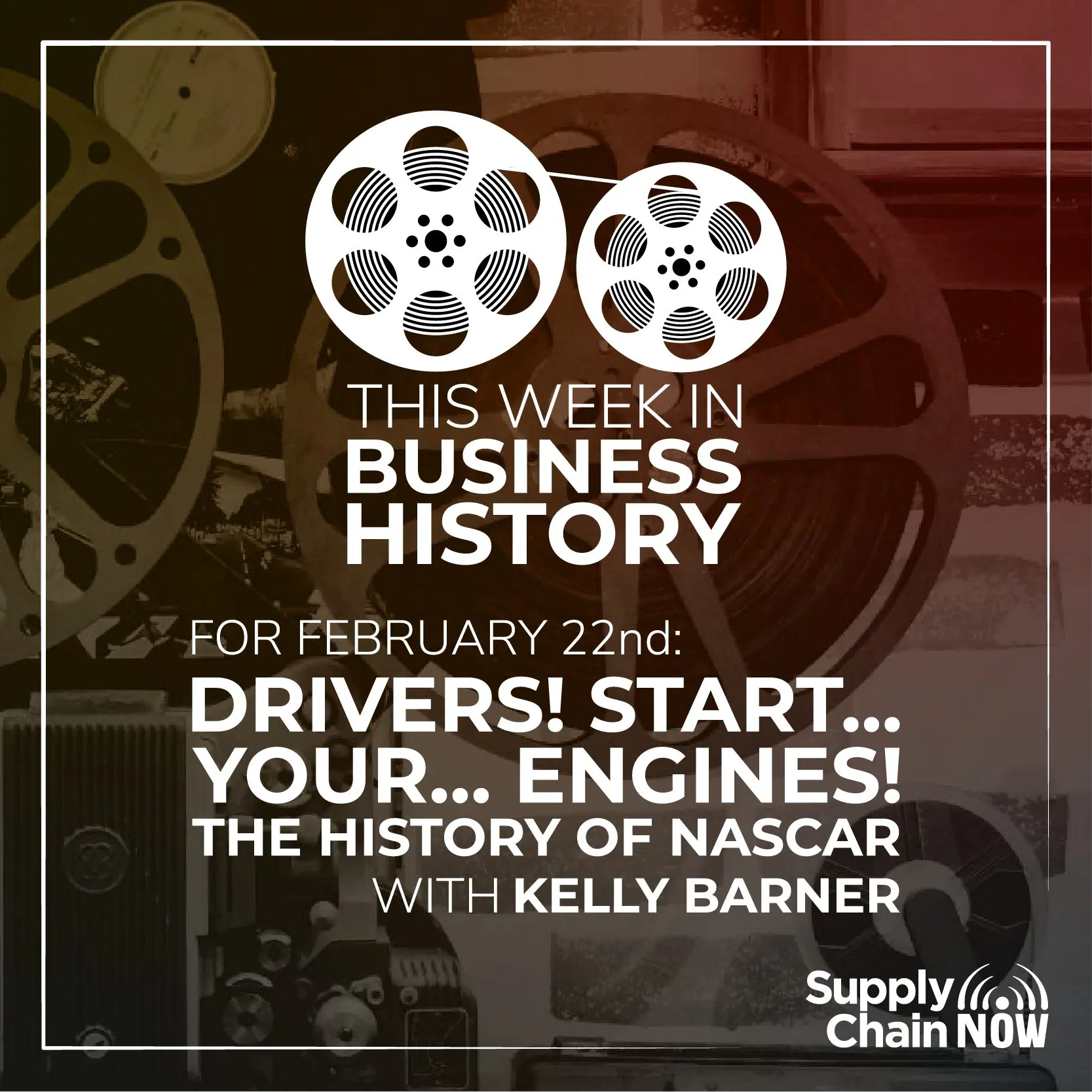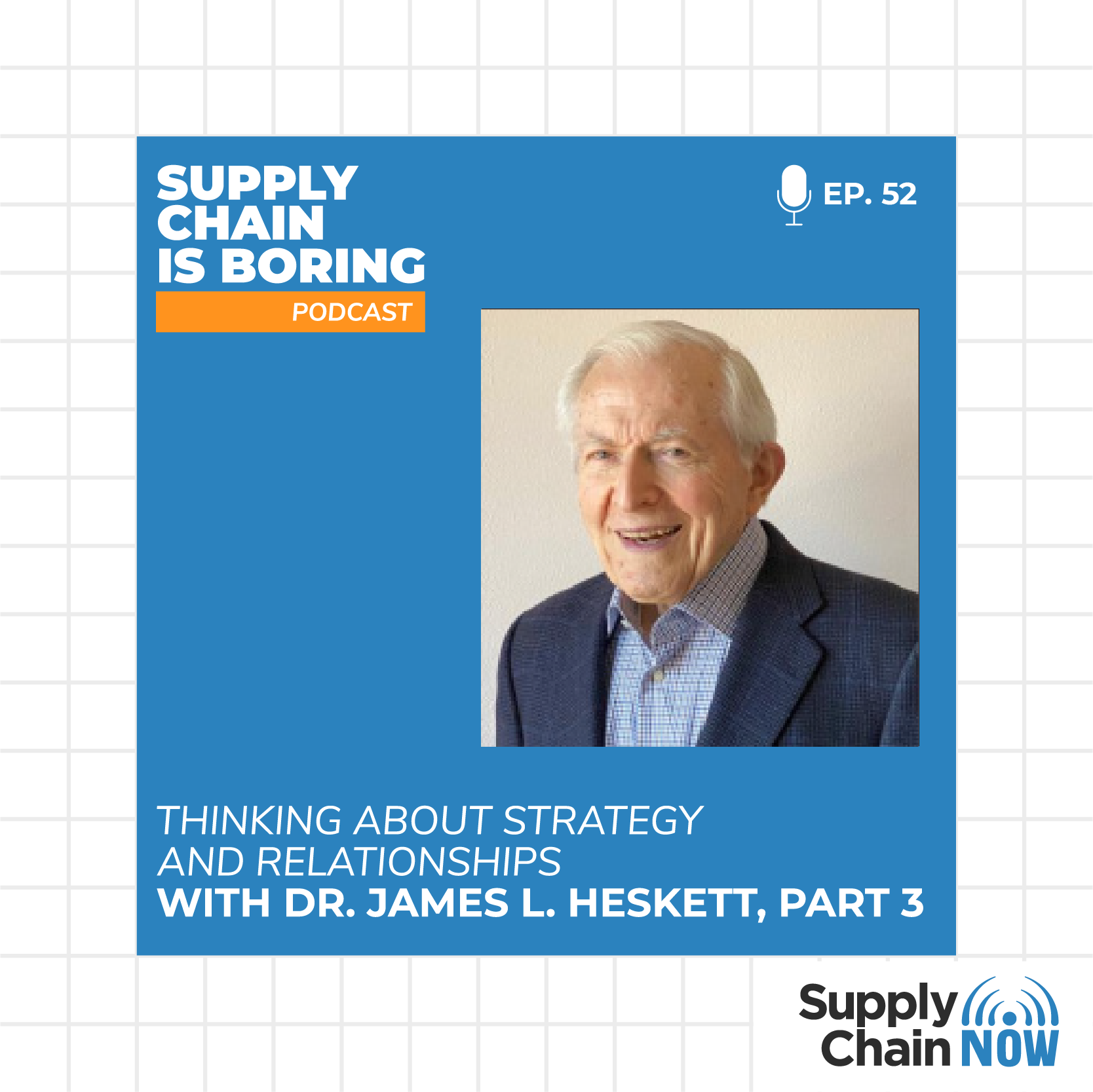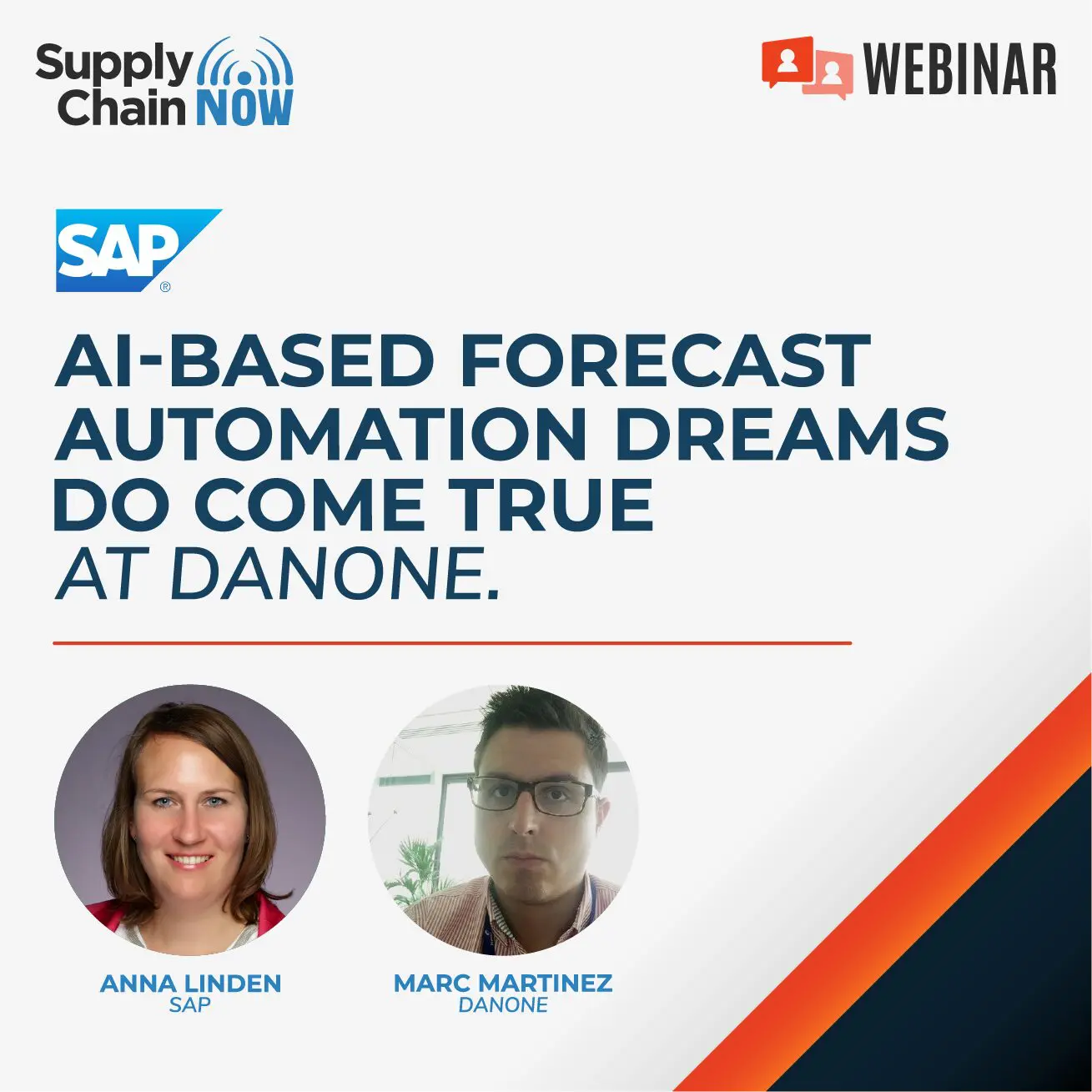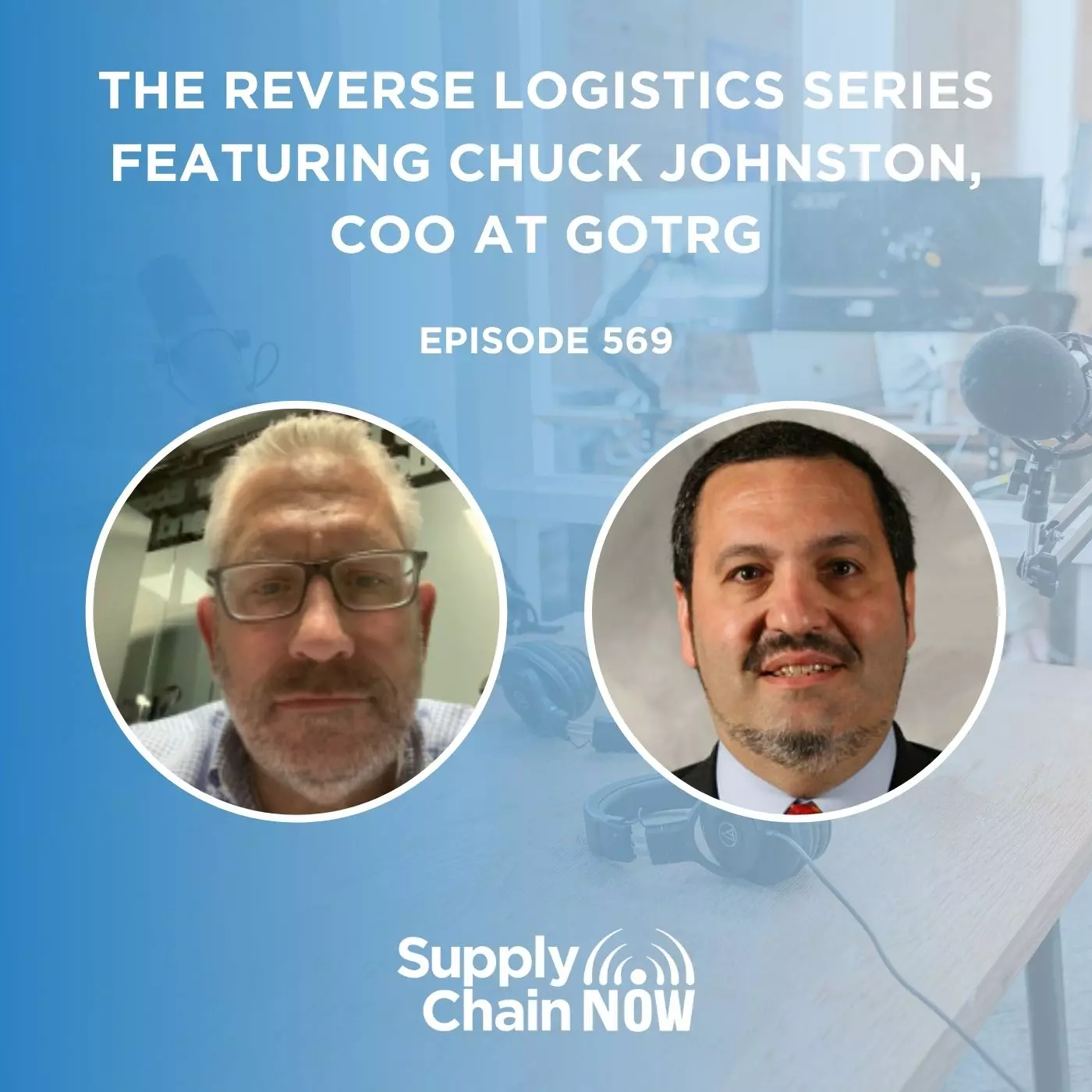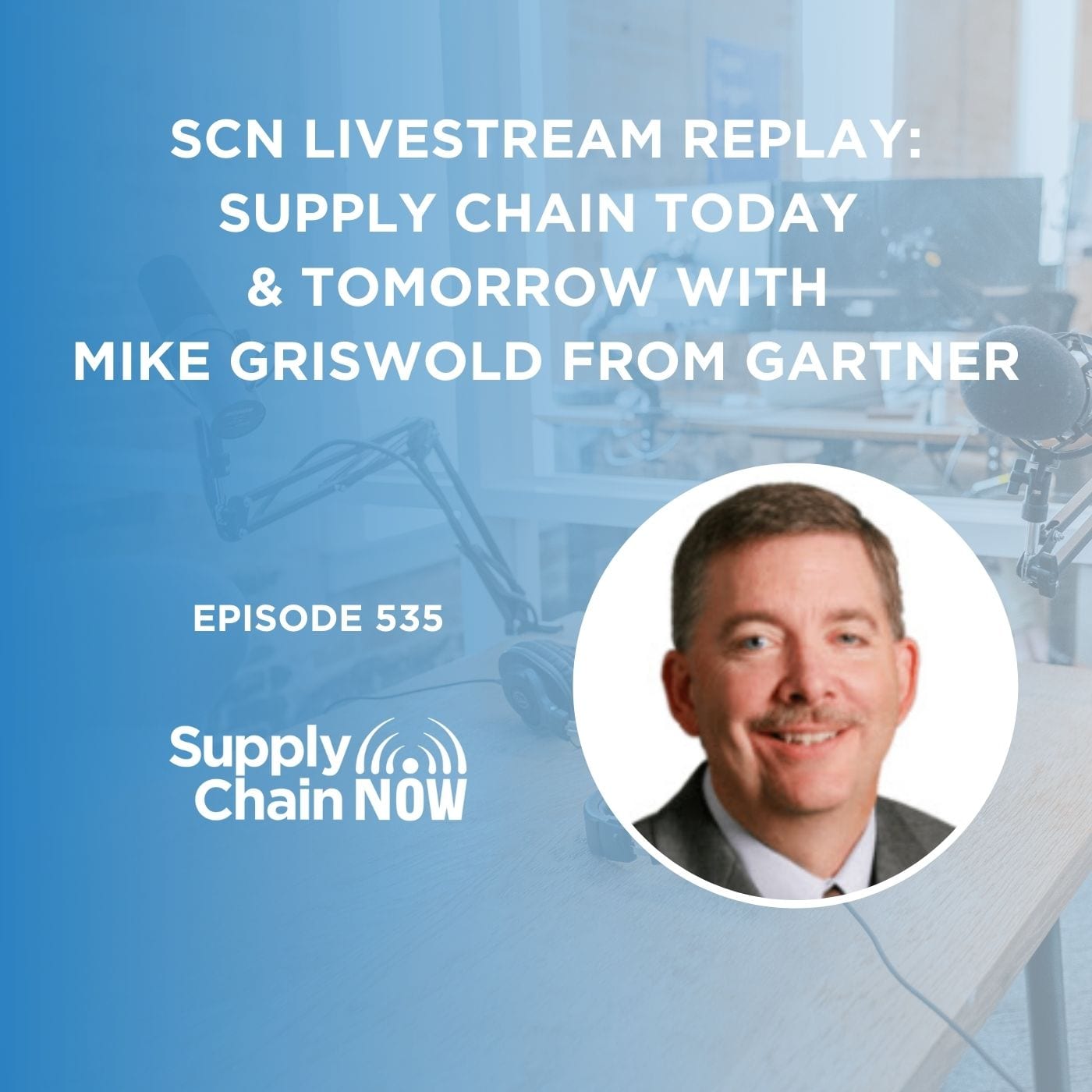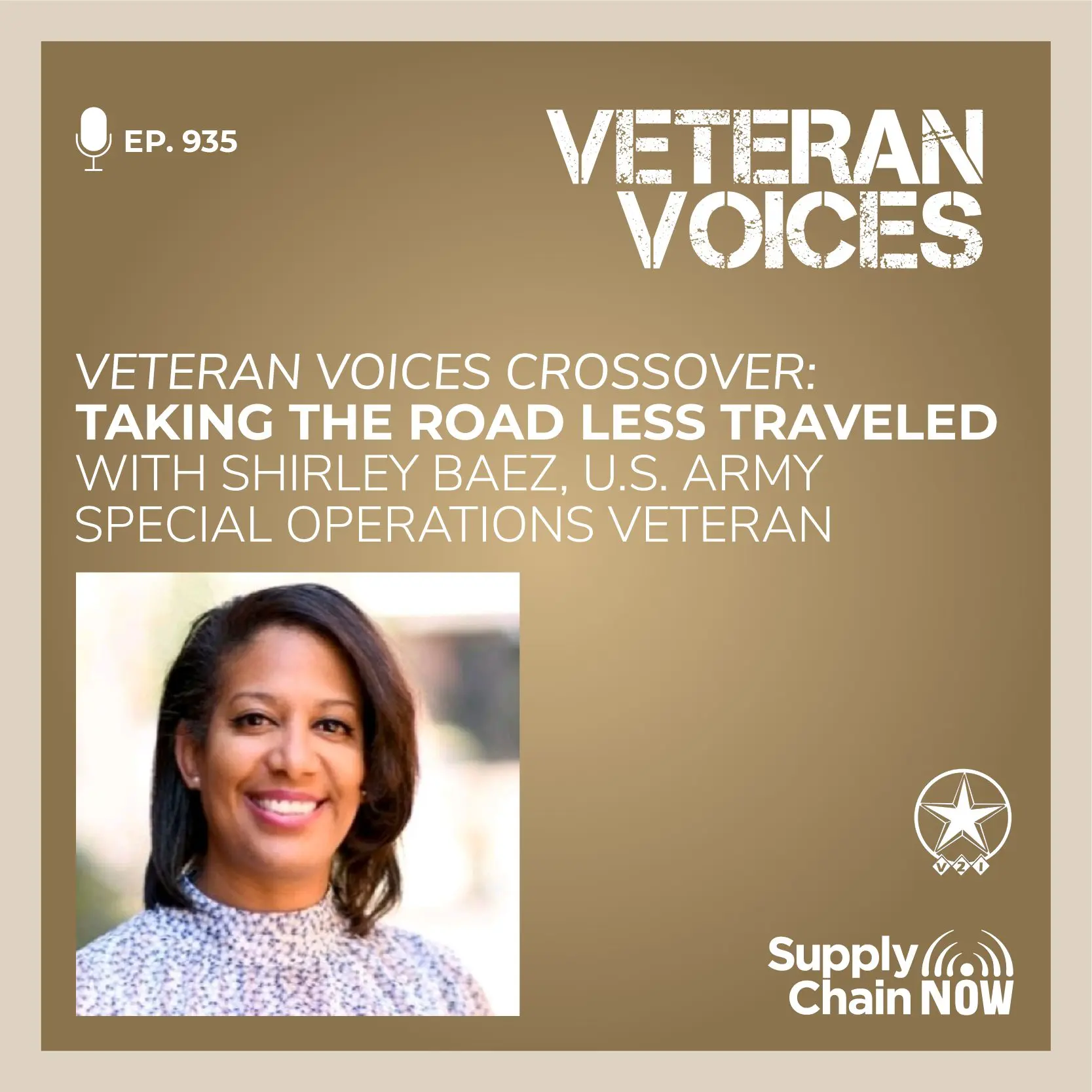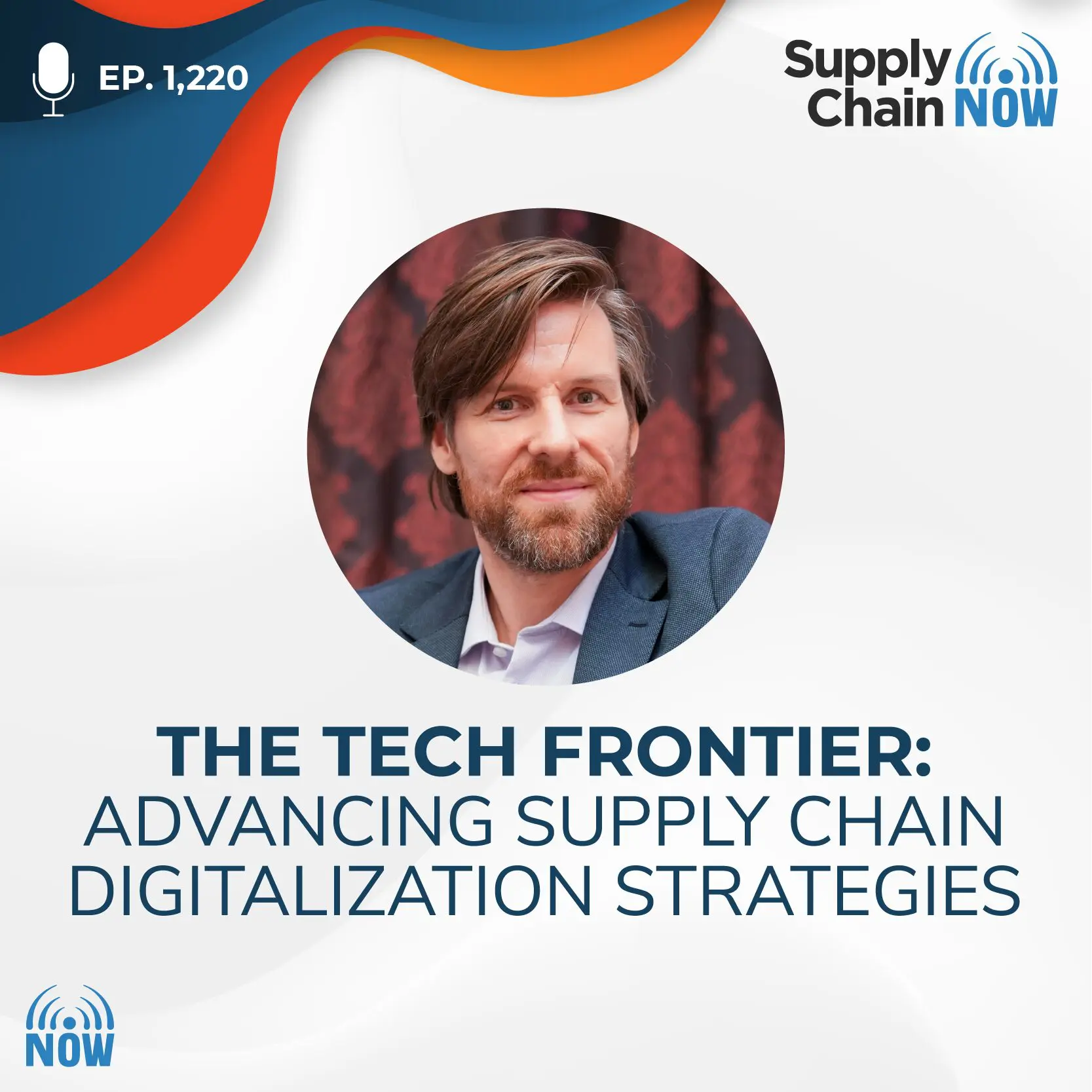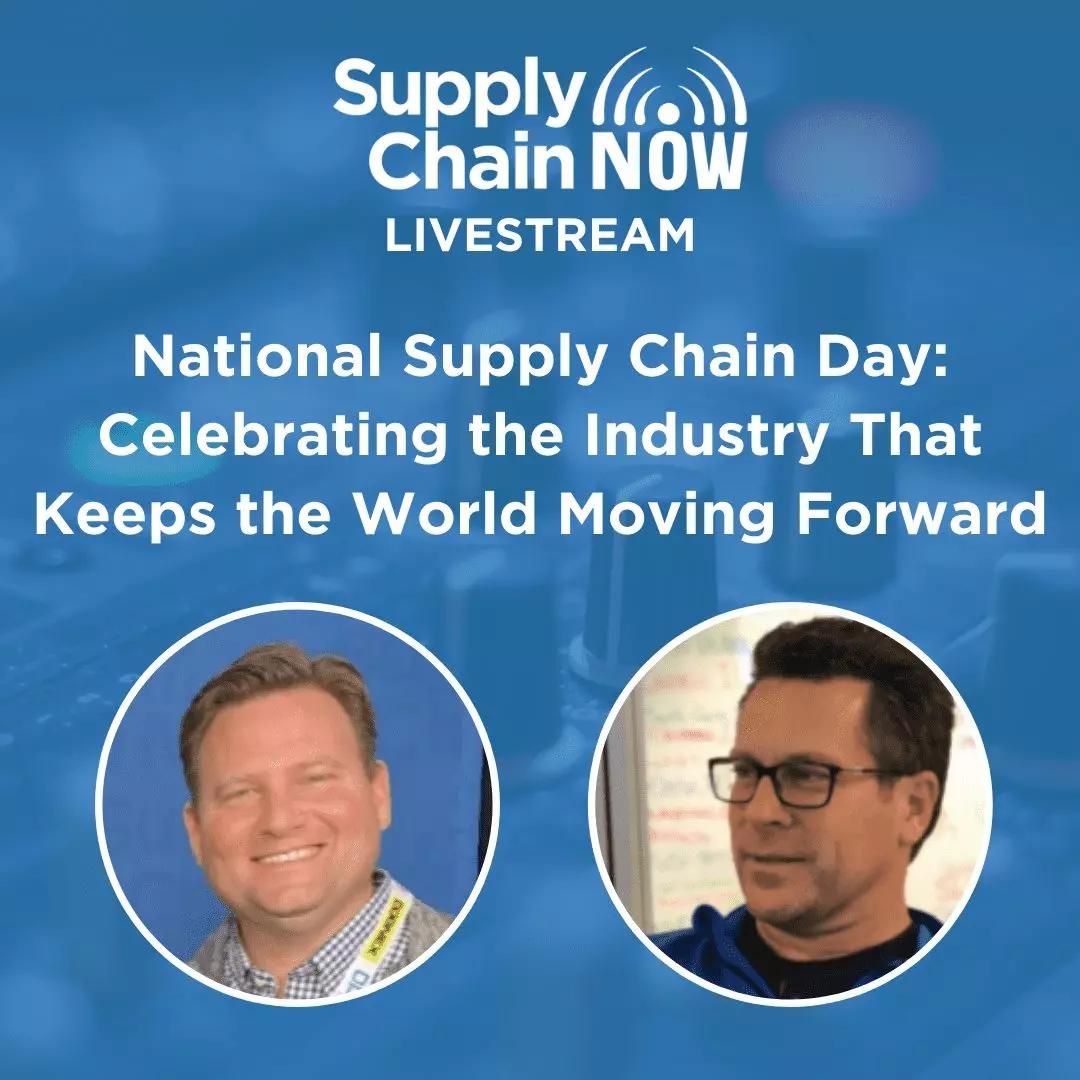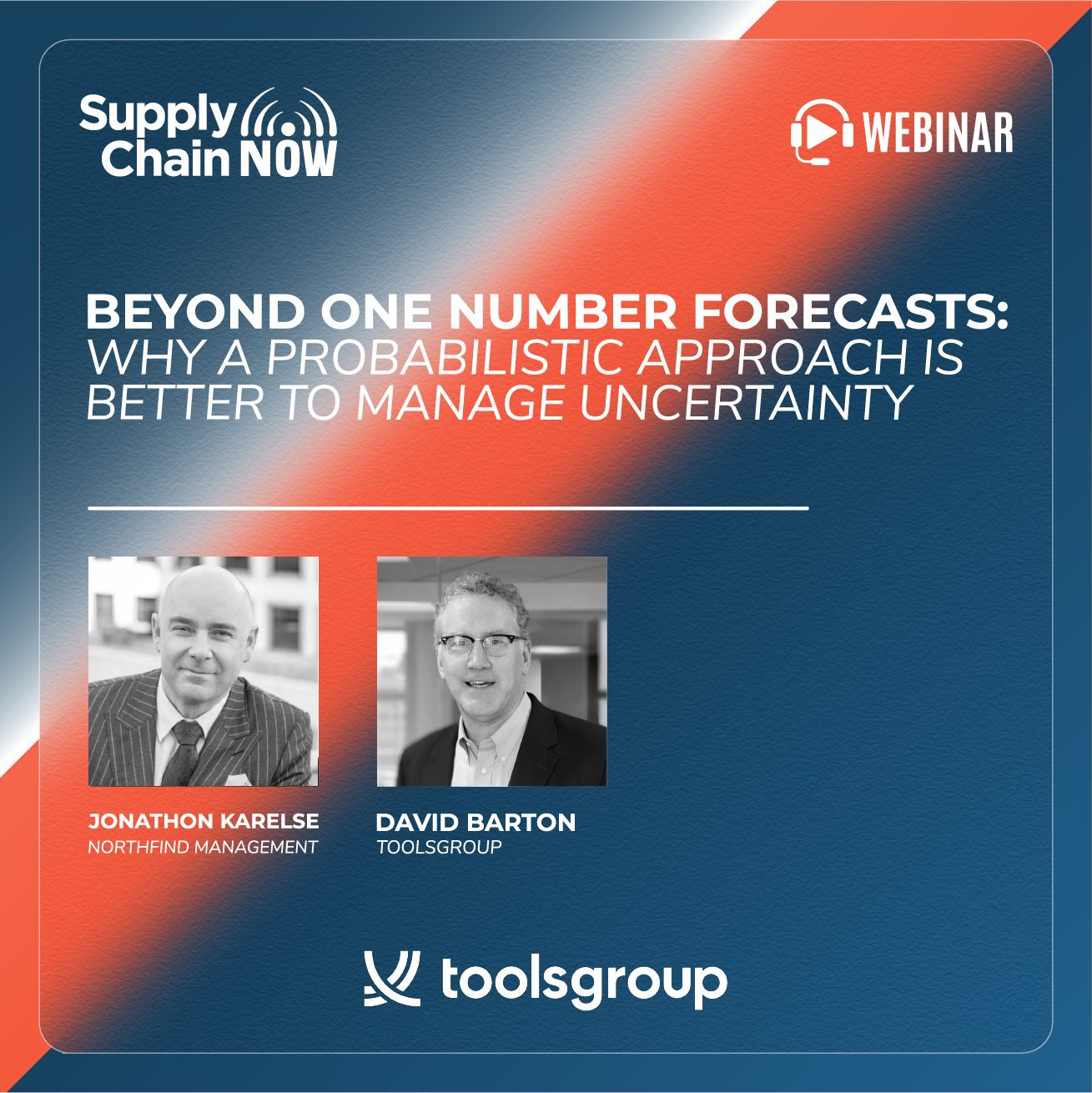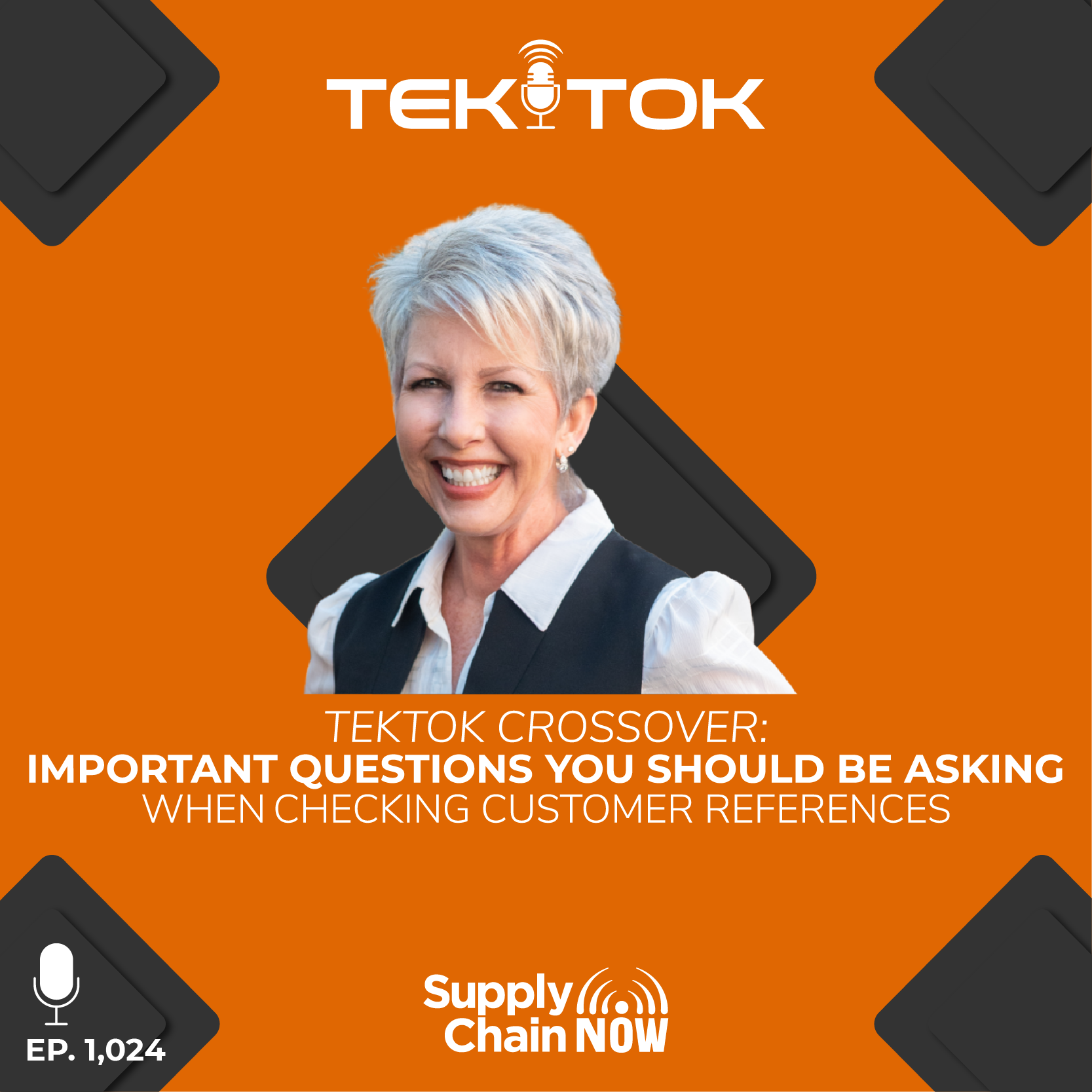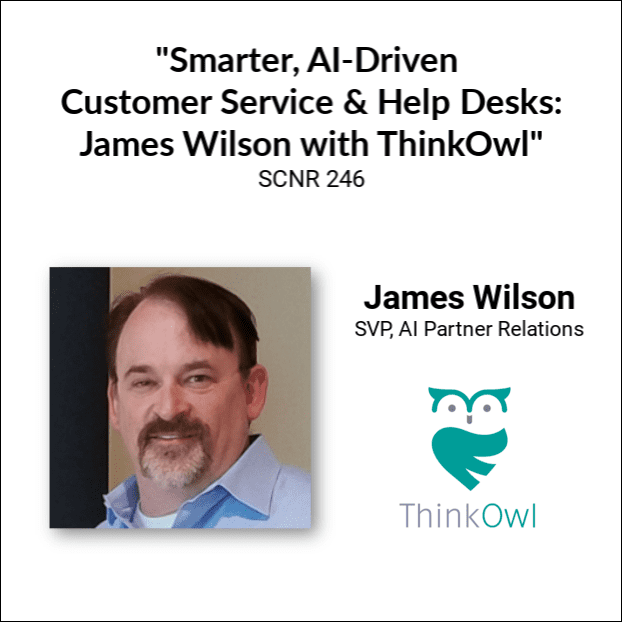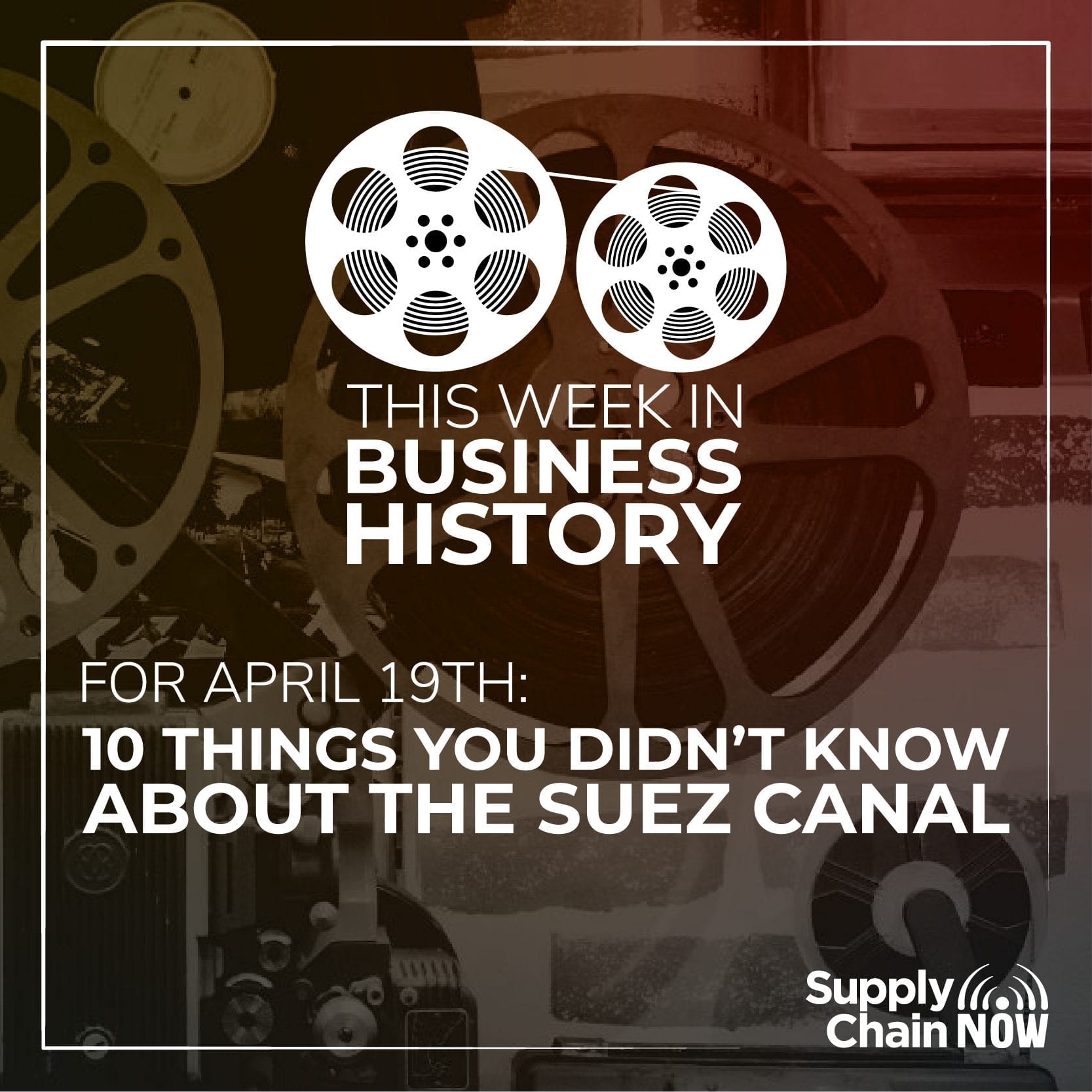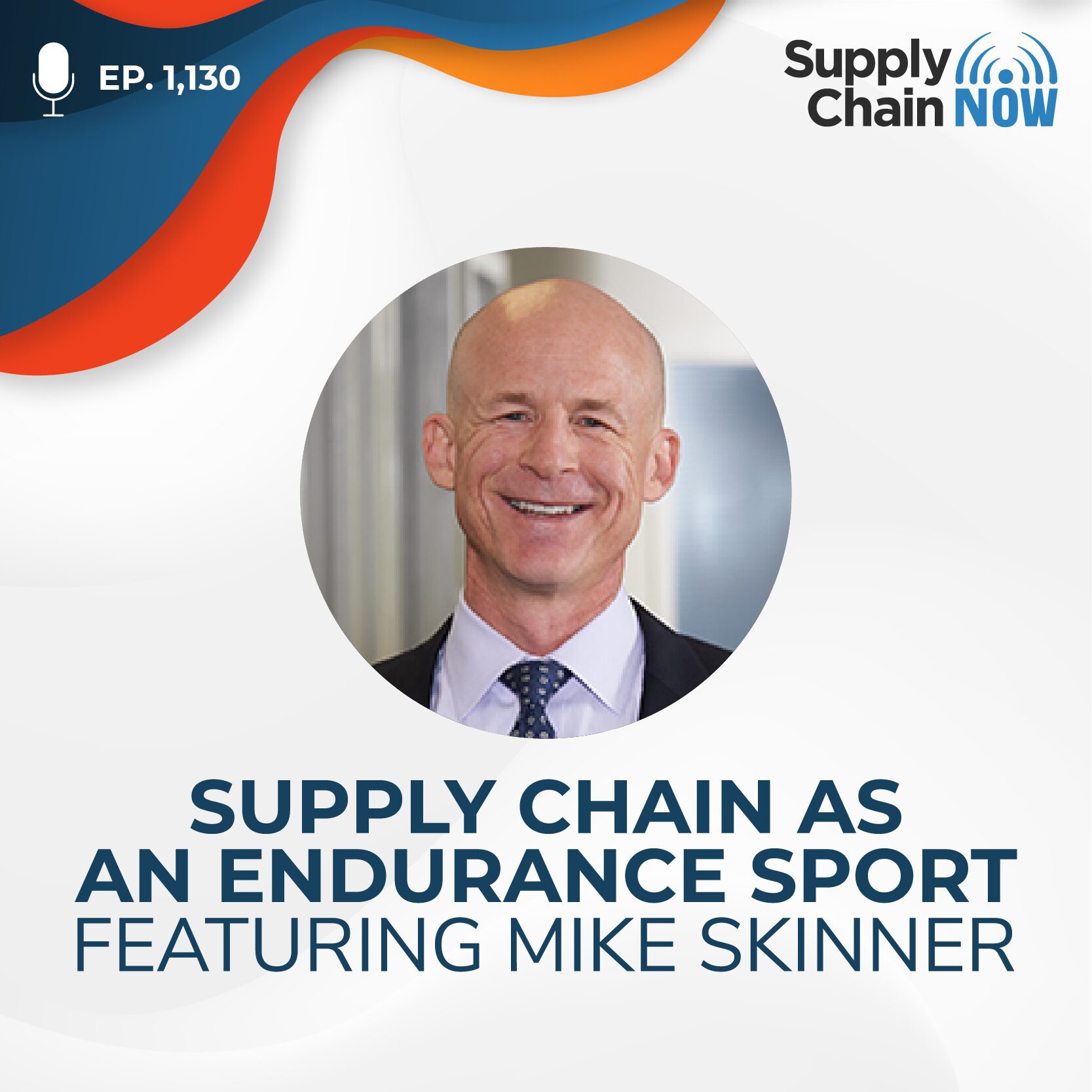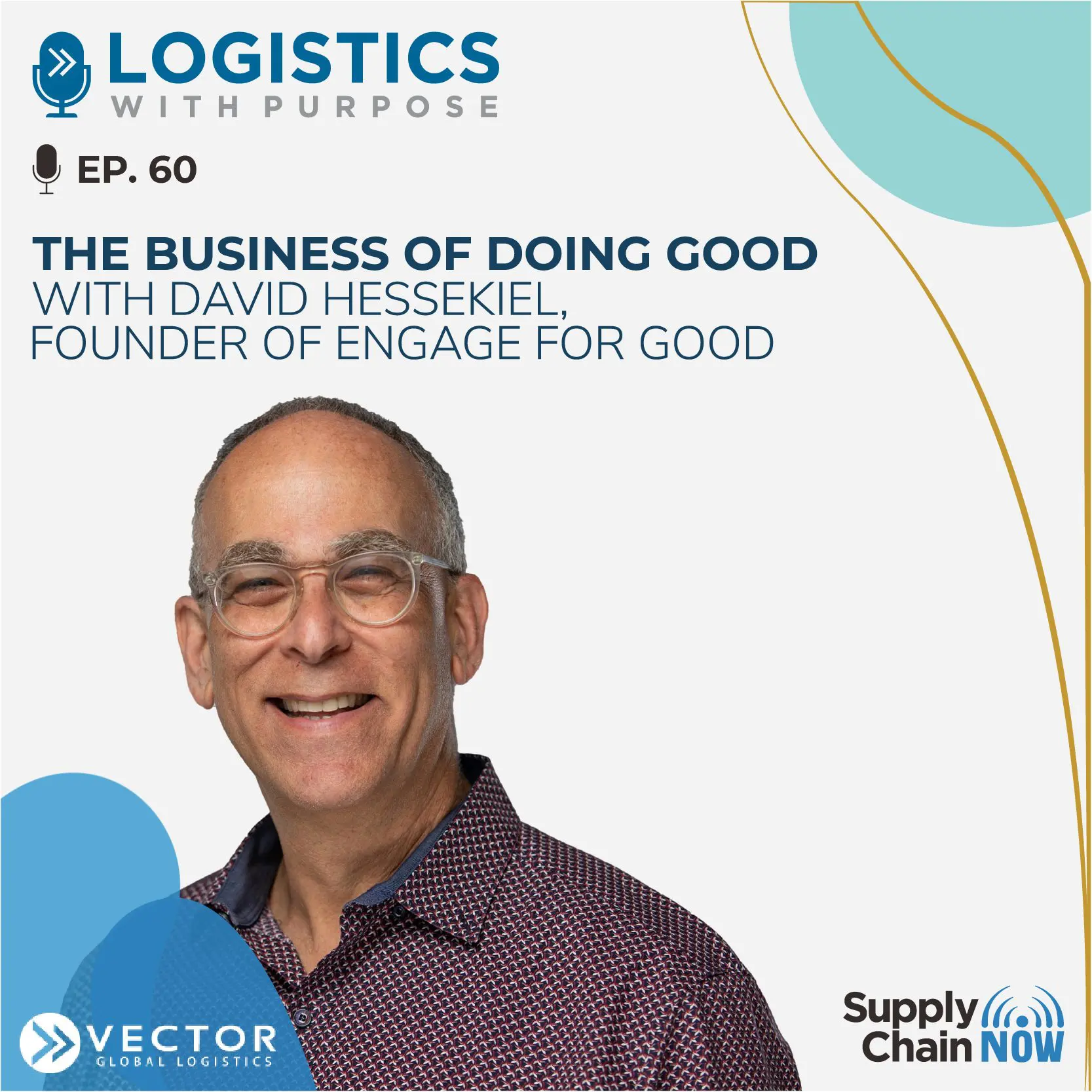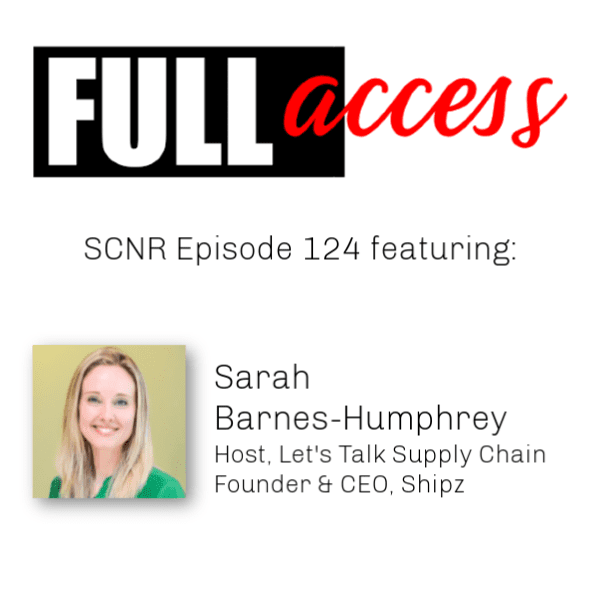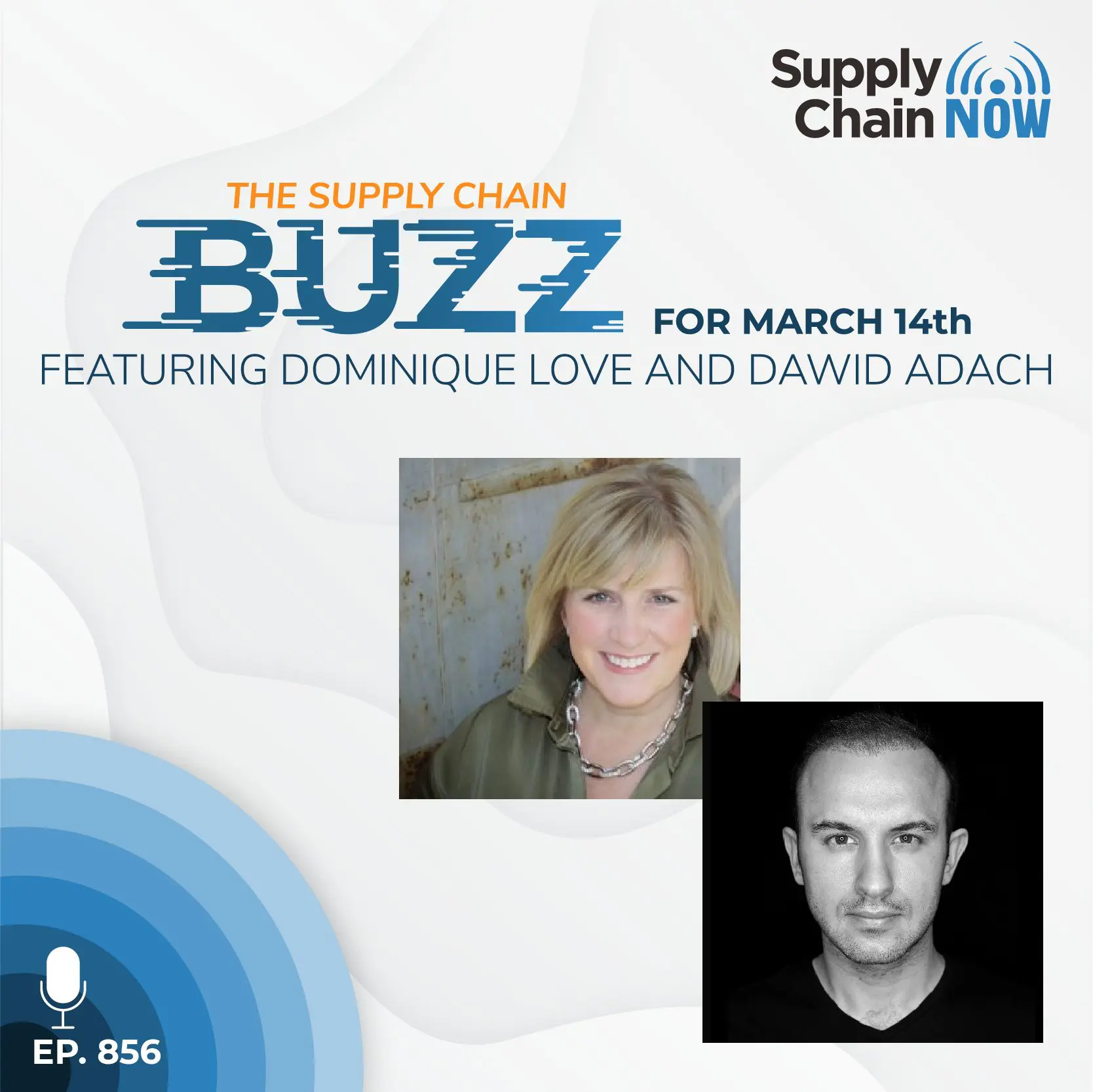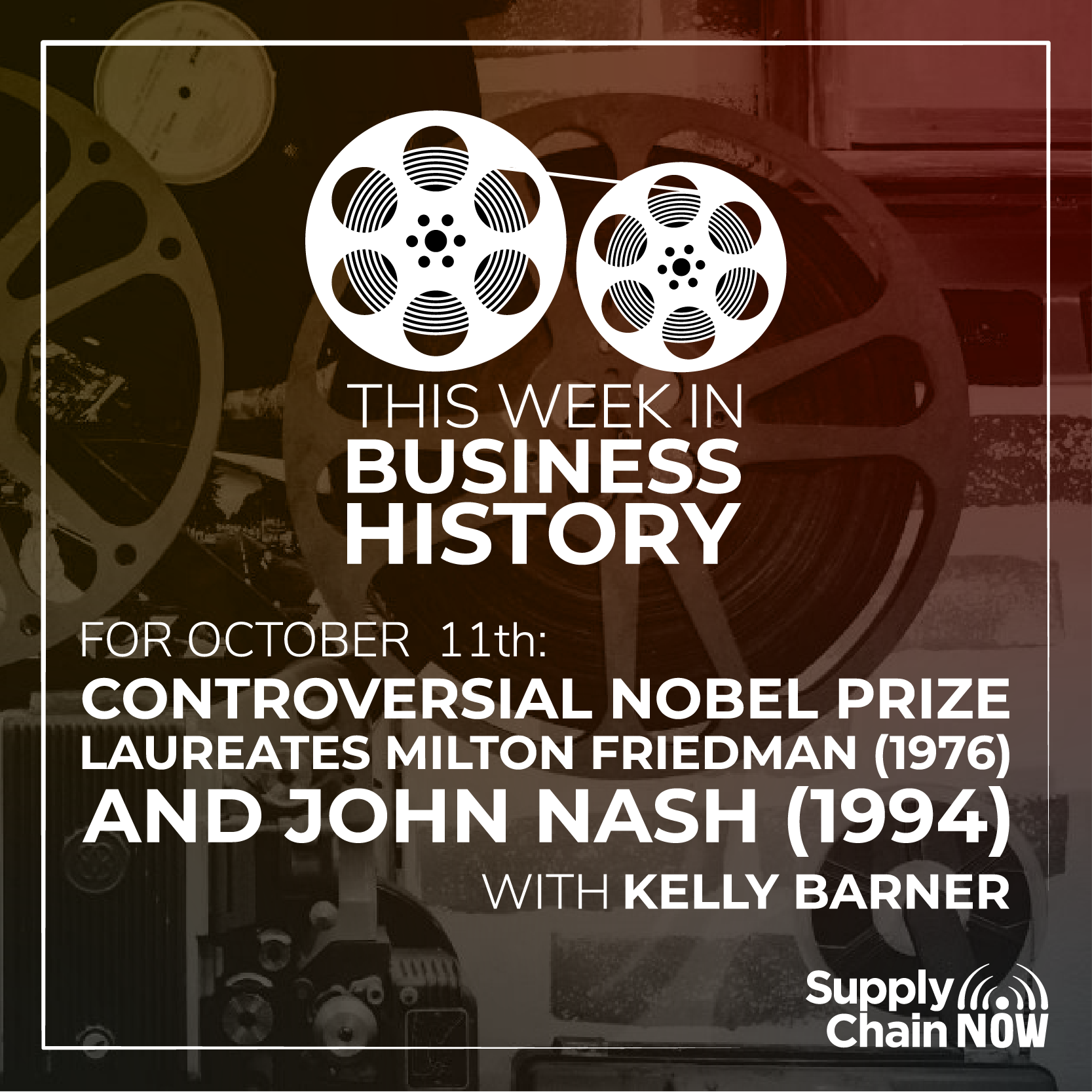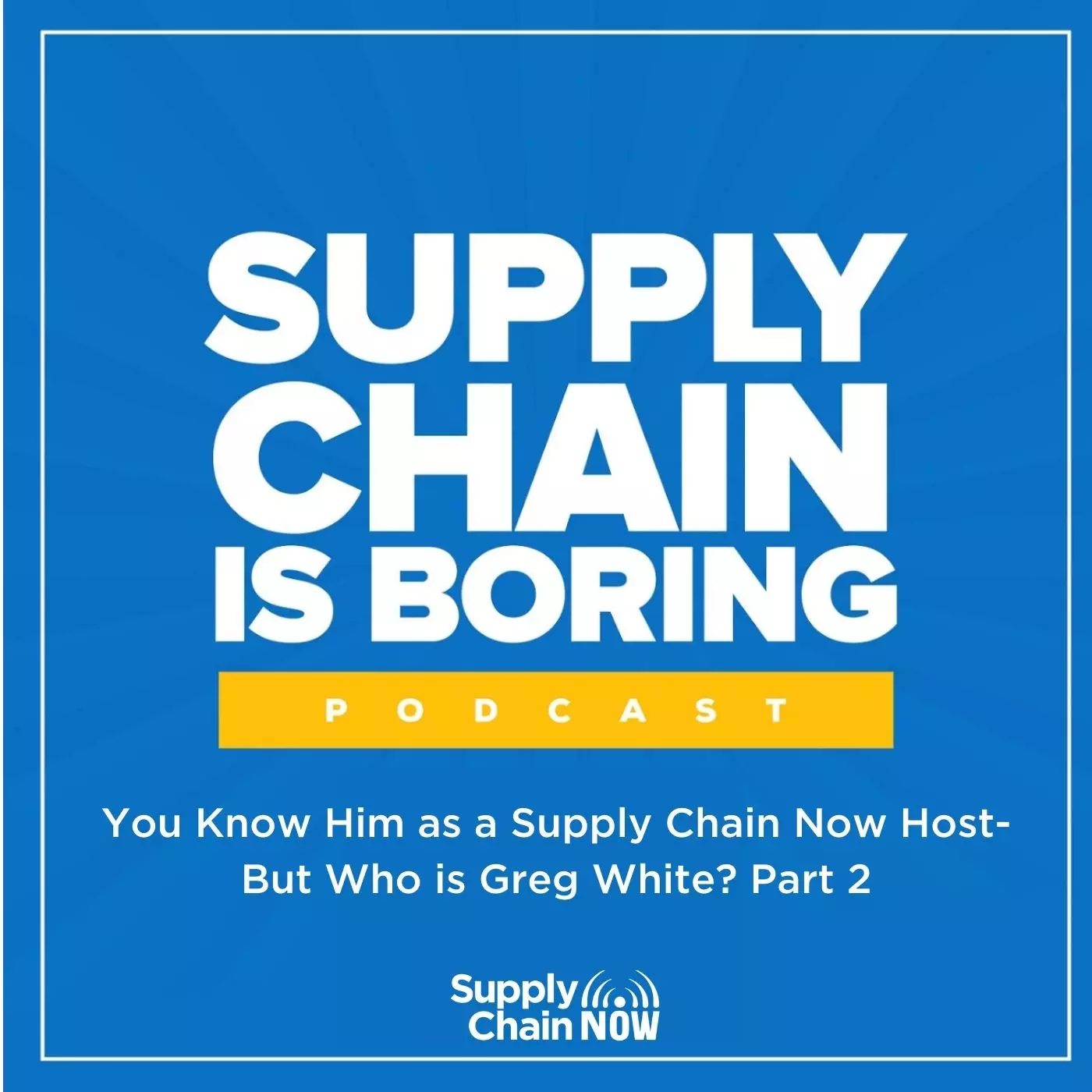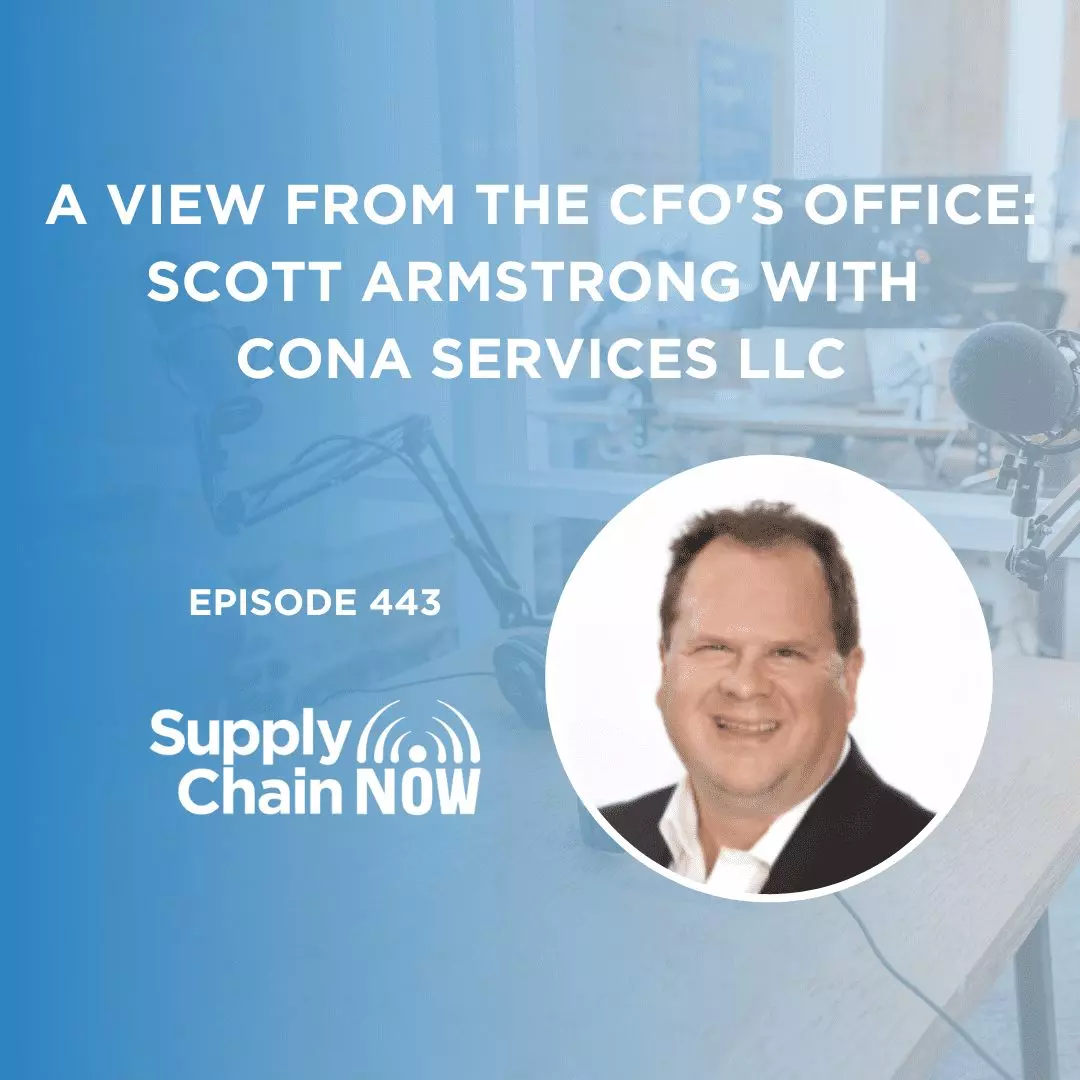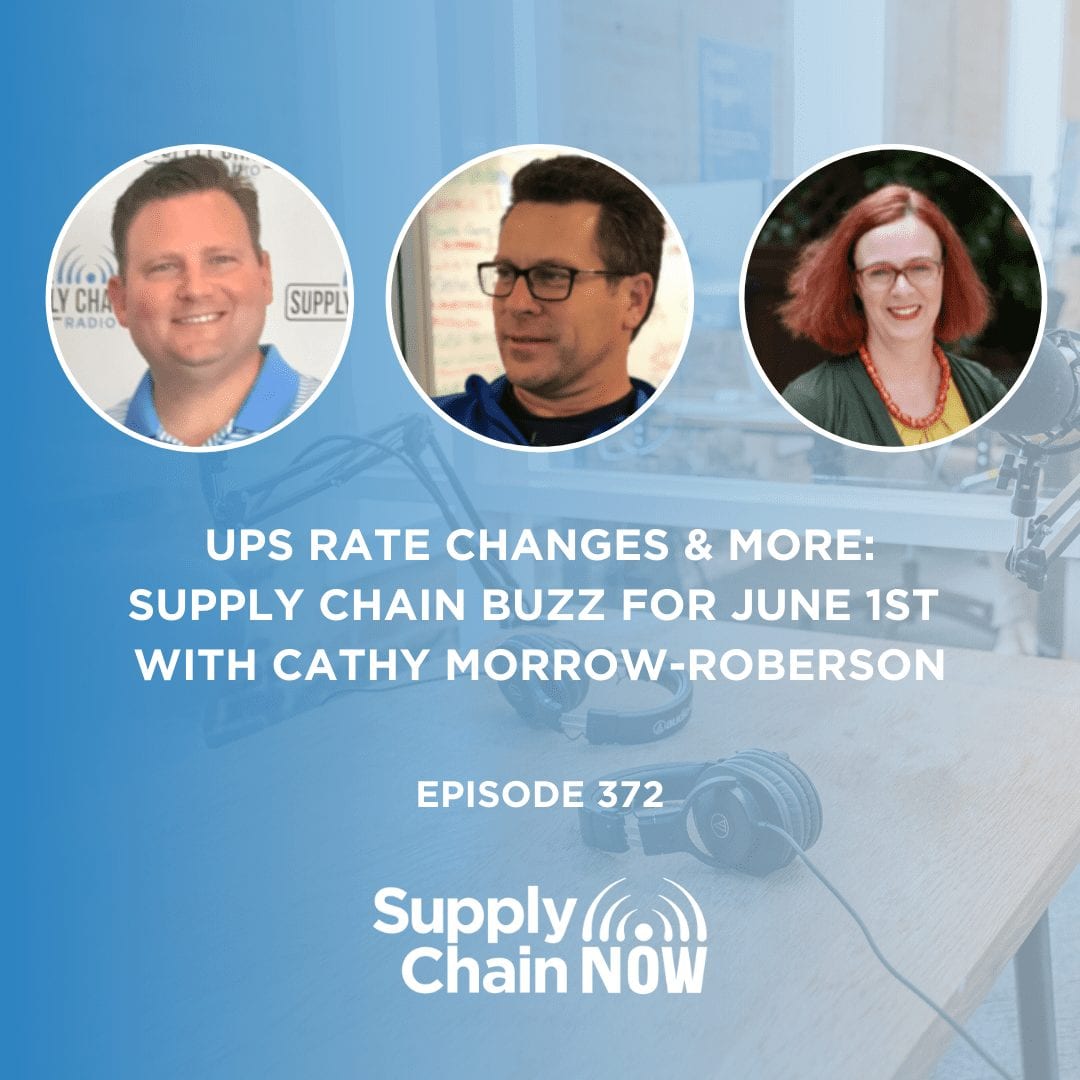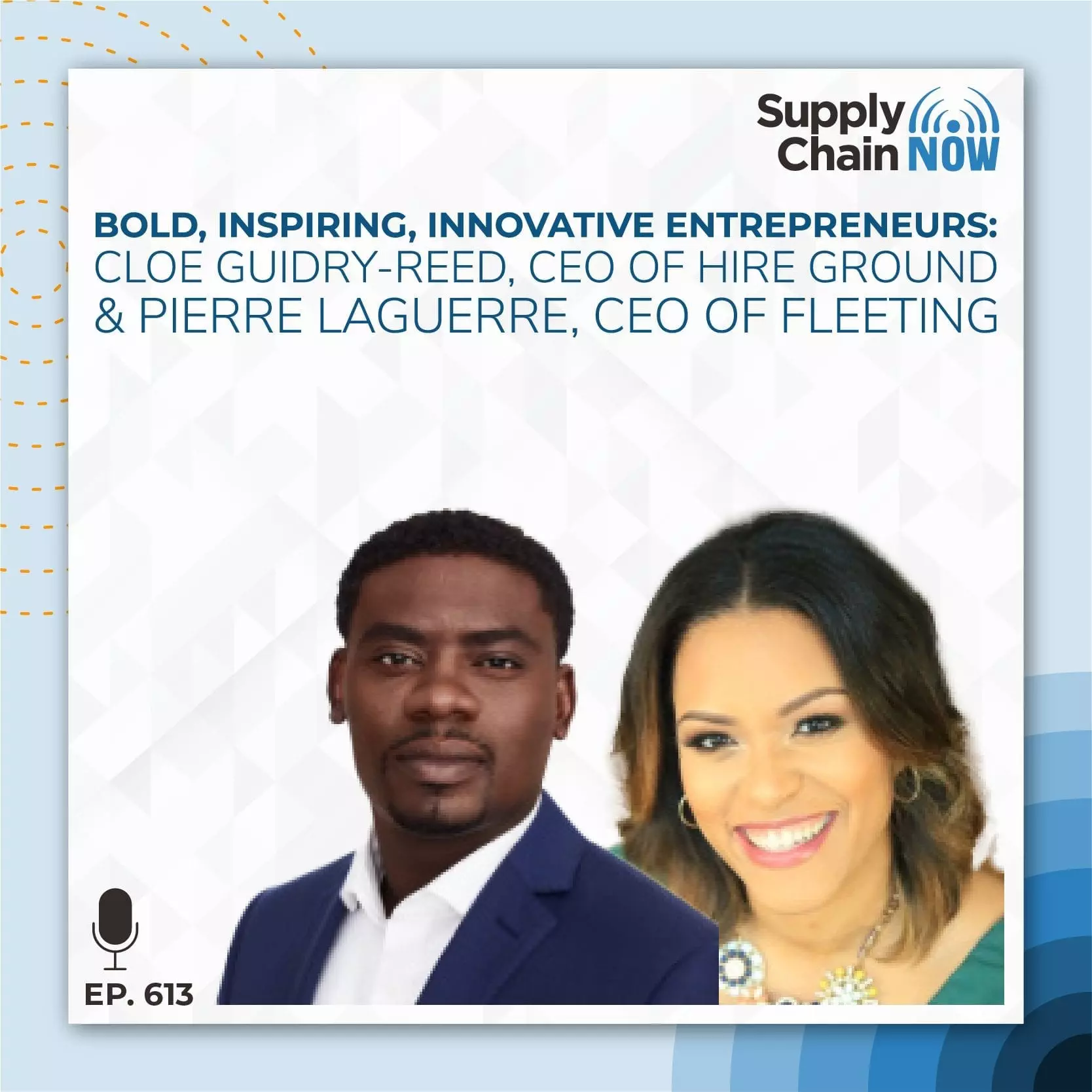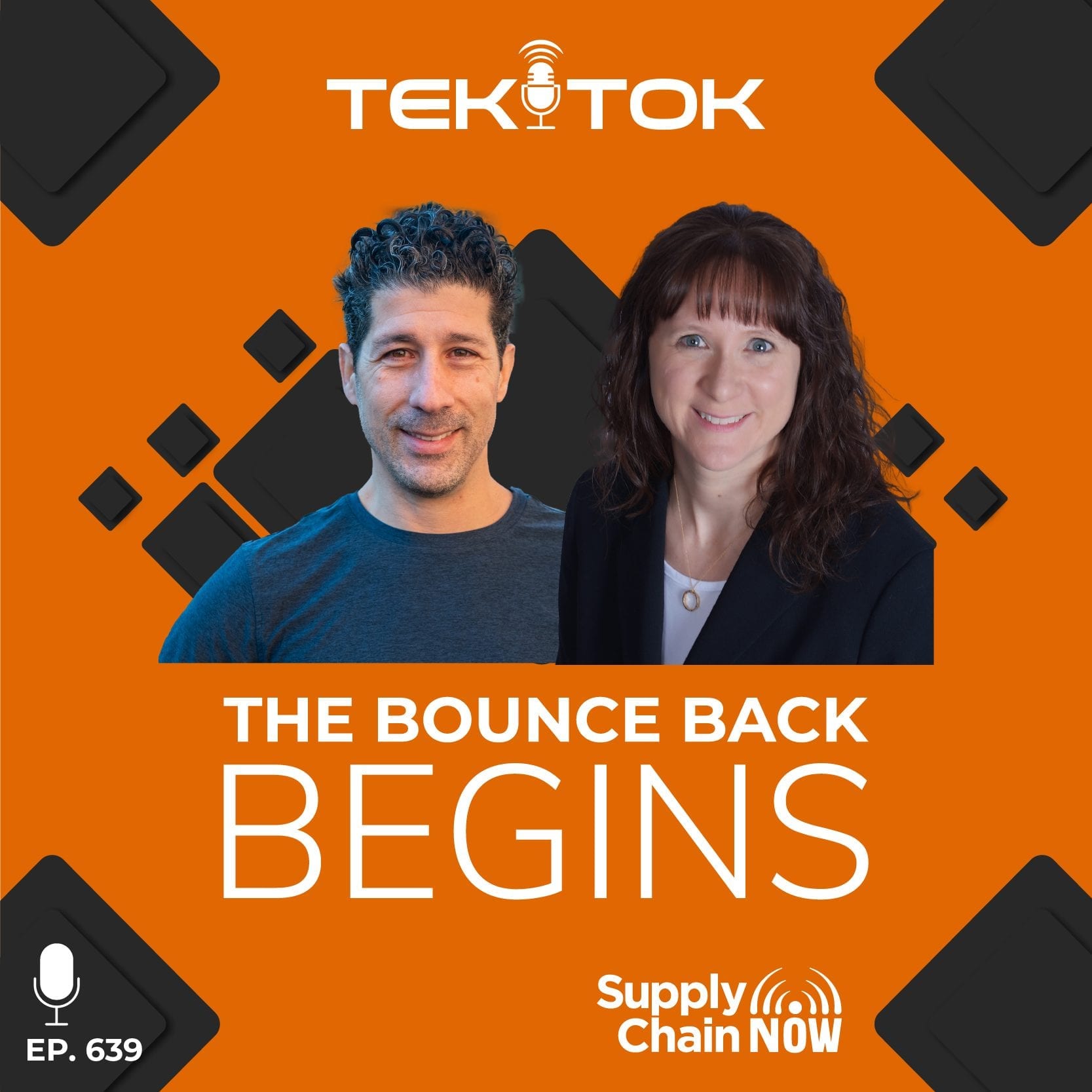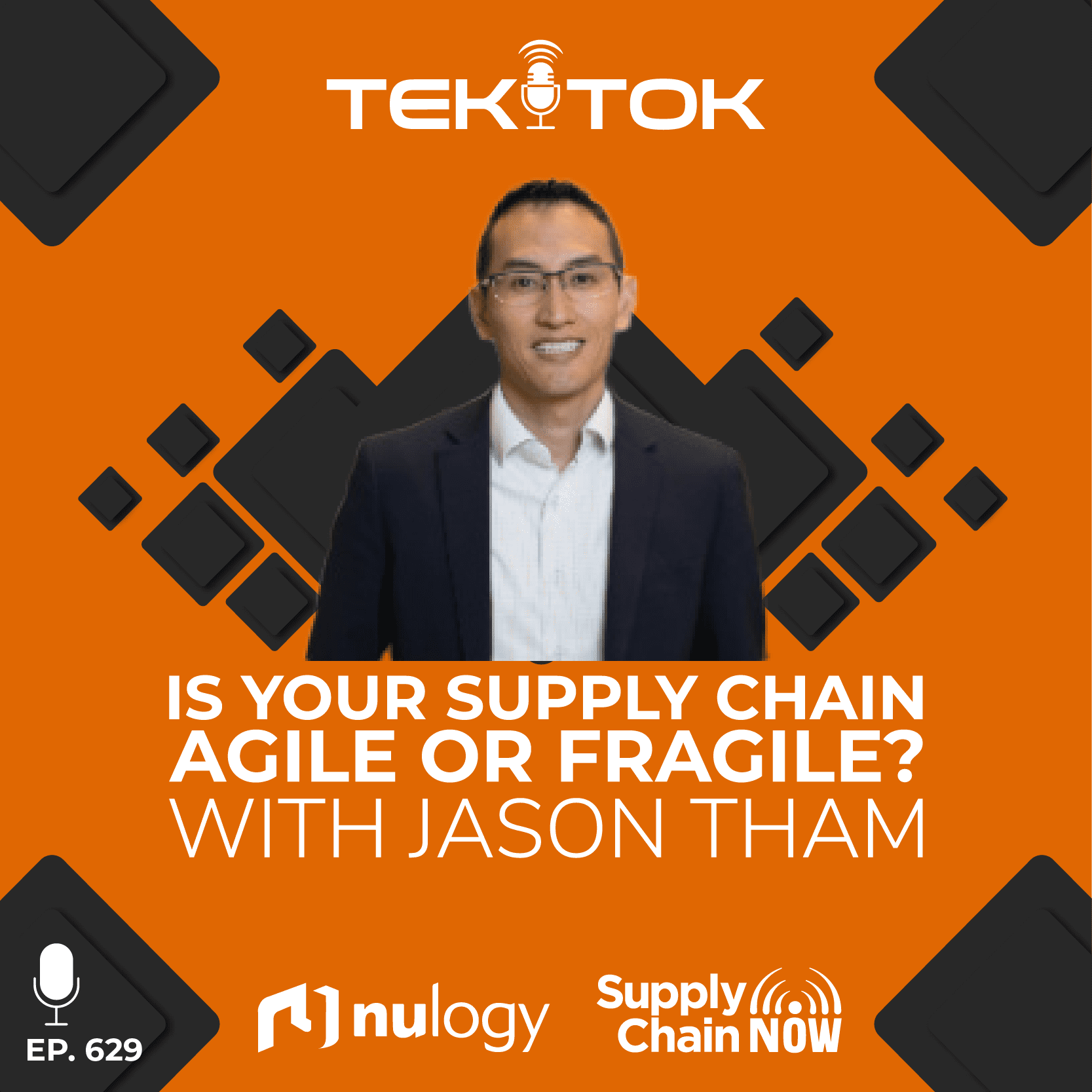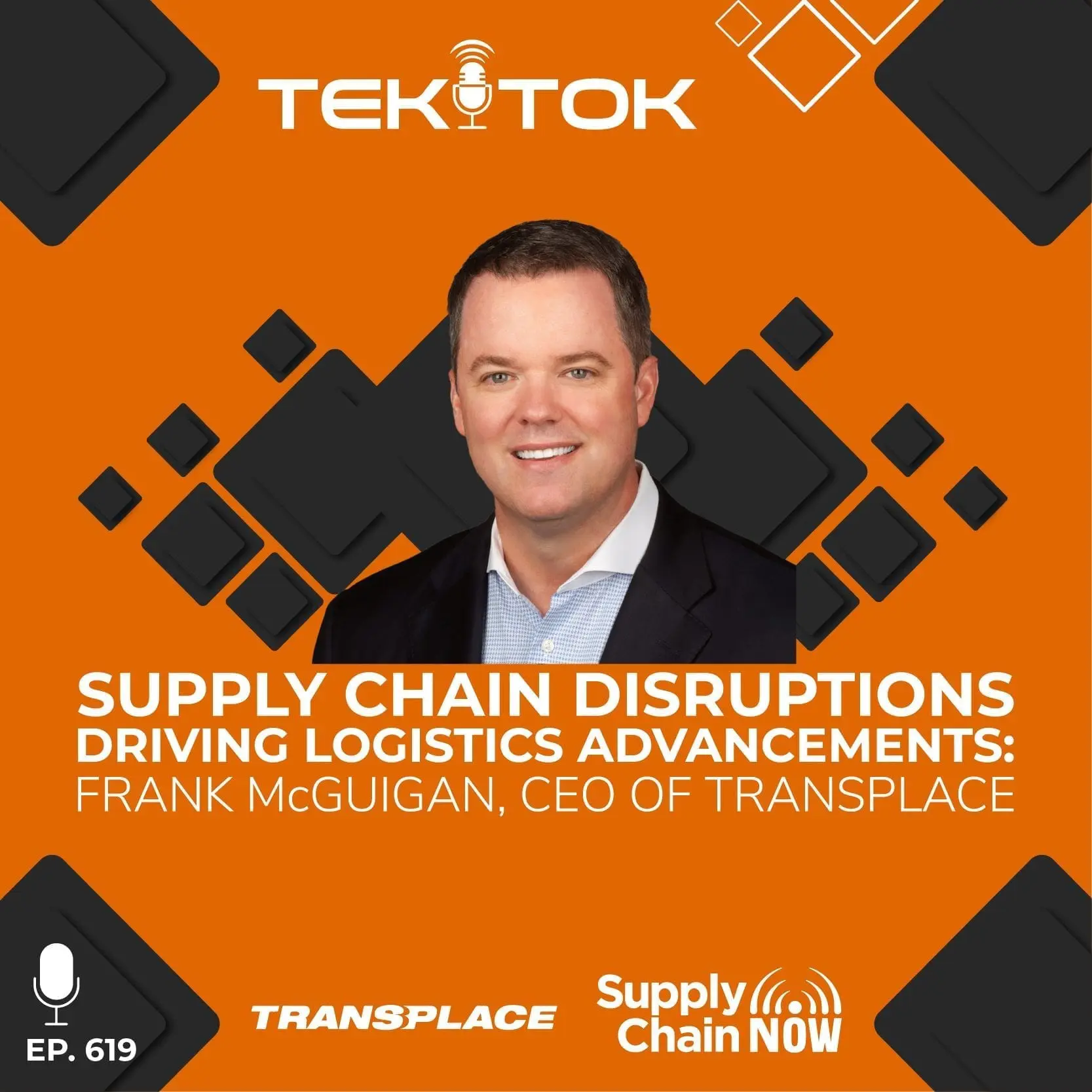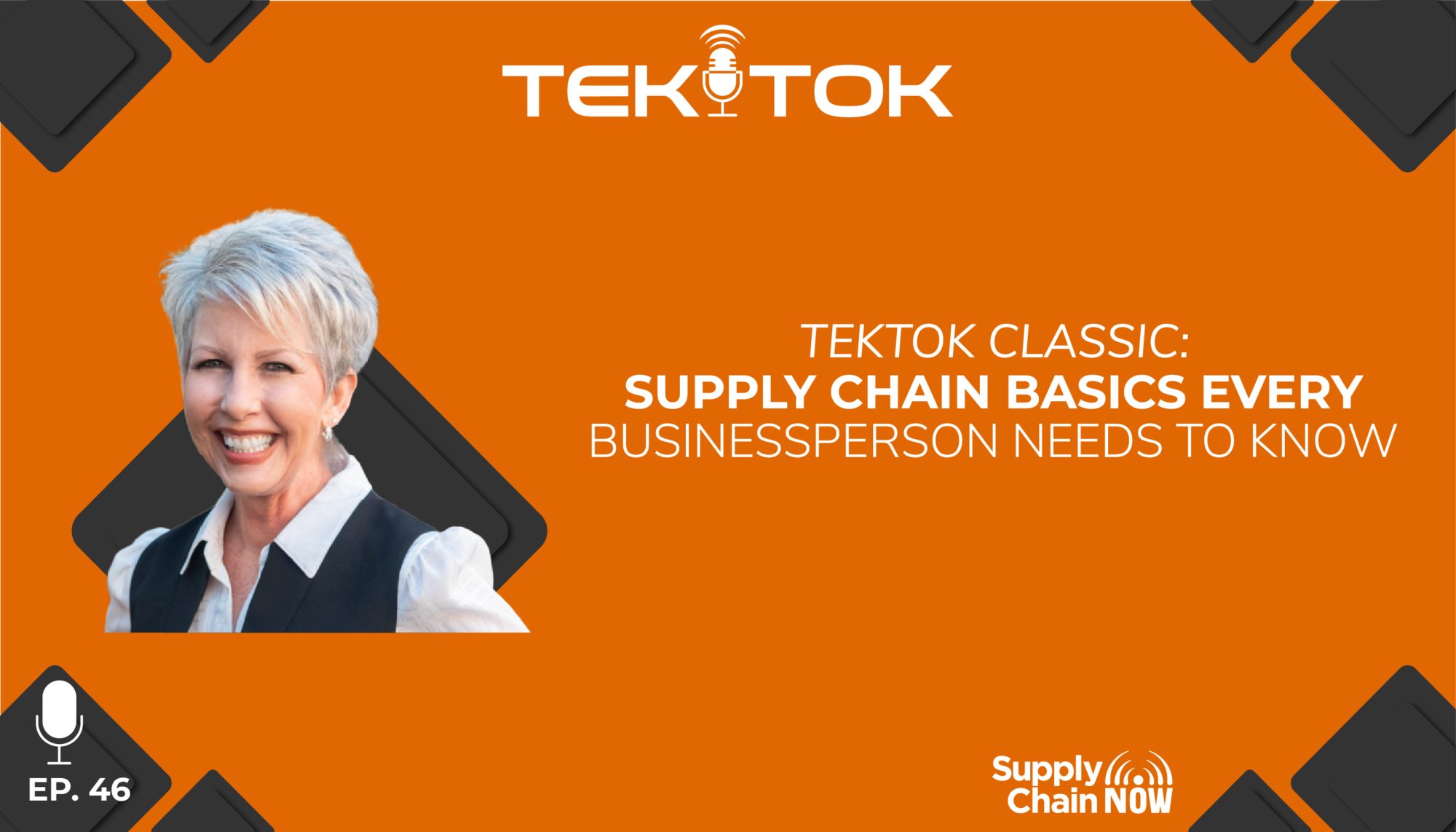
The first time a human being moved raw materials or a finished product from Point A to Point B, BOOM! The supply chain and the need to plan began to take shape.
-Karin Bursa, Host, TEKTOK
Episode Summary
As a Supply Chain Technology industry advisory and the Host of TEKTOK, Karin is often asked to provide an overview of supply chain basics for executive leadership teams, new hires, and interested investors. Clearly, each of these audiences has very different points of view but they all seek to understand and be more engaged on a variety of supply chain topics. This classic TEKTOK episode covers some of the basic building blocks that lay the foundation for significantly more information, complexity, and opportunity. Your colleagues, family and friends will certainly have a better understanding of the important and remarkable work you and your teams do every day!
Episode Transcript
Intro/Outro (00:01):
Welcome TEKTOK digital supply chain podcast, where we will help you eliminate the noise and focus on the information and inspiration that you need to transform your business impact supply chain success and enable you to replace risky inventory with valuable insights. Join your TEKTOK, host Karin Bursa, the 2020 supply chain pro to no of the year with more than 25 years of supply chain and technology expertise and the scars to prove it. Karin has the heart of a teacher and has helped nearly 1000 customers transform the their businesses and tell their success stories. Join the conversation, share your insights and learn how to harness technology innovations to drive tangible business results. Buckle up is time for TEKTOK powered by supply chain now.
Karin Bursa (01:05):
Well, welcome back supply chain movers and shakers. Karin Bursa here. I’m your host for TEKTOK, the digital supply chain podcast. Thanks for tuning in today. You know, in this episode, we’re gonna cover some supply chain basics. These are the basics that every business person or investor should understand, and maybe every one of your family members as well before all of you supply chain experts. Yes, that’s you, you supply chain movers and shakers before you skip forward to the next TEKTOK episode. Let me suggest this. You may wanna share this particular episode with family friends, coworkers that just need that foundation in supply chain. I hope it gives them a better understanding of the remarkable and important work that you and your teams do each and every day. So in my role as a supply chain technology industry advisor, I am often asked to provide an overview of supply chain basics for executive leaders for new hires and for interested investors that’s right, these same questions.
Karin Bursa (02:21):
These same fundamentals, um, are provided for a wide variety of audiences. And clearly each of these audiences has a very different point of view. They’re seeking to learn and understand for very different reasons, but quite honestly, they all boil down to understanding how companies serve customers and do so in an efficient and profitable manner and how this, how supply chain can help to differentiate them in the marketplace. All right, so these building blocks often lay the foundation for significantly more information, significantly more complexity, and a better understanding of market opportunity. So I thought I would share some of them with you here on tech talk. So as many of you and I, I have my little cheat sheet by the way. So if you’re looking at this on video, you see my notes. If you simply look down a couple of times, I just wrote, I wanted to be sure to cover with you today.
Karin Bursa (03:22):
So when COVID 19 shut down the world in March of 2020, that’s right. We are just a little over two full years of the impact of such an extreme disruption on business, on supply chains on personal life. And when my friends and family could no longer get hand sanitizer bottles of water or toilet paper, the supply chain suddenly got personal and they finally began to understand more about why I have invested more than 25 years into helping companies get the right pro to the right place at the right time at the lowest possible cost right products, right place, right time at the lowest possible cost. So supply chains have always been a part of daily life and product based businesses. In fact, many with even argue that service based businesses have supply chains as well, but let’s, uh, let’s keep things very simple here. Remember, this is some supply chain basics, or really some, uh, some fundamental building blocks, uh, that can help you kind of get that, uh, thought process underway.
Karin Bursa (04:39):
Maybe Kate, some folks that are not hip deep in supply chain each and every day. So the first time a human being moved raw materials or a finished product from point a to point B boom, the supply chain and the need to plan began to take shape. So I know many of you are thinking, okay, that’s just logistic, come on, stay with me. Um, we’ll get to all of, uh, some of those nuances in just a moment. So defining a, a fundamental supply chain includes a number of different business functions and functions that you will hear discussed time and time again are planning, right? So planning what needs to be moved or produced sourcing, sourcing, what needs to be, or is important for production or distribution, manufacturing, distribution. And that includes warehousing and transportation right through to consumption of those and returns. Yes, there is a returns element of supply chain as well.
Karin Bursa (05:49):
So the reason we have supply chains is, is driven quite simply by the fact that we can’t instantaneously produce our products and have them at a place or time that the customer wants them. Right. I can’t just say, I need this product and I’m ready for it. Now, even Amazon, which can get you delivery in one day is delivering per products to you that have been produced and stored in advance. And so those are some of the elements we’ll dig into. We have to anticipate customer demand. We have to think about it and plan for it in advance. That means that we need to forecast when and where that customer demand will occur. Are you with me? Okay. Since we are not all knowing psychics, we leverage technology to help predict future needs at a specific time and location and channel more on that in a minute.
Karin Bursa (06:56):
But in essence, we need to understand the time phased needs of our products, and that is what we are going to forecast. And that’s what demand planning is. So not just forecasting, but doing things to shape and build, and in, in some, uh, elements pack, uh, in a way that the consumer or the customer is interested in, um, in purchasing, I know I’m getting ahead of myself, let me stick with these basics. Okay. So as we plan, we talk about things like the horizon of the plan and the planning horizon tip covers a number of different buckets or the ability to zoom in or zoom out on different horizons. And those horizons can cover anything from hours quite honestly, to days, weeks, months, quarters, and even years. So most supply chain technology is going to give you some ability to zoom in, to vary granular levels of your plan or zoom out to more macro levels.
Karin Bursa (08:14):
So why you might ask well, because it takes time to source raw materials. So the stuff that’s needed to produce our products, that’s raw materials, and it takes time to convert those raw materials into our finished product, right? So the finished goods or the inventory that we sell to our customers. So once those finished goods have in fact been manufactured or produced, we need to get them to market AKA the location that the customer wants to take delivery. Okay, so this could be a retail store, or we could ship direct to consumer, you’ll hear D to C direct to consumer direct to your home, or we could sell to other businesses and not as termed business to business. Okay. At every step along this supply chain, which kind of quite honestly is really a network, but a, a along this supply chain, there are different quantities and stopping points.
Karin Bursa (09:24):
These are referred to as nodes. So different places that can be planned or visualized nodes, different elements along that line. So things like quantity discounts, full container pricing, um, packaging, uh, cartoning uh, all of these elements help us to move our products to store and move our products in a sensible way, in a quantity that our customers would like to purchase. Okay. So let me give you a really simplistic example. Um, if you take an egg, right, a, a, a chicken egg, um, it’s easier to ship a dozen eggs than it is to ship a single egg, right? Fragile. We need to protect it. Um, if I’m shipping one egg at a time, it gets very expensive. And my, um, my damage rate may be very high. If I ship them in a carton of a dozen eggs, they are in a packaging that helps to protect them.
Karin Bursa (10:28):
And then often those cartons of eggs, a dozen eggs, maybe in a case. And that case may have say 30 cartons in it. Are you with me? So what I’m doing is actually moving those products to market in a more efficient manner. And part of that planning process helps identify those ideal sizes, um, both for purchase by your customer, but also to store and ship those goods. All right. So that’s pretty simple example, hope it’s not too basic for you, but, but you’re probably starting to appreciate where some of this complexity gets exponentially mind boggling. All right. Okay. So let’s go back and just talk about a few definitions. I’ve in these words already, I’m looking at my cheat sheet here. I’ve got the half a dozen words down here that I wanna be sure to cover with you here today on TEKTOK, the first is really, really fundamental, and that is supply chain management.
Karin Bursa (11:31):
So supply chain management is the domain. If you will. It is the process of managing all of these details. It integrates and synchronizes that word synchronizes very important. All the physical financial and data flows that organizations and their partners need to fulfill demand for products. So I just really said a mouthful, but, um, when we talk about partners in the supply chain, we are talking in essence about customers who buys from us and suppliers who supplies, goods or services to us, right? So when you think about these chains, we typically think about the customers pulling demand and the suppliers responding to our demand, our needs makes sense. And that’s what we think of as kind of a pull based market strategy. Um, so as think about supply chain management, remember our end goal here is to have the right product at the right place at the right time for the lowest possible cost.
Karin Bursa (12:44):
Okay. You’ll hear that time and time again, that phrase, right. Product right time, right place, right. Cost has been used for or decades. And it still works. It’s a complicated, um, set of algorithms and artificial intelligence that helps companies achieve that. But that’s the bottom line. That’s the desired outcome. Okay. If you’re still with me, you’re starting to appreciate why this is so hard, why we need technology and science, why there’s so much conversation about artificial intelligence so that we can get everything where it needs to be in the best, at the best possible cost so that we can create profitability for our business while serving our customer very, very well. So supply chain management is often divided into two significant groups. The first is supply chain planning and the second supply chain execution. So supply chain planning covers all the activities that occur as we anticipate market needs, customer needs, as we source and produce those goods.
Karin Bursa (14:05):
And then as we store or move those to the ideal distribution center, think of that as the activities that occur before I have my finished goods, I’m oversimplifying, but it’s a great way to consider supply chain planning versus supply chain execution. So supply chain execution, the word execution came from the product is manufactured, and now I need to execute or fulfill customer orders. And so supply chain execution typically focuses on warehouse operations, uh, transportation, the, the, the need to move those goods, uh, to the customer or inbound or outbound more on that in just a minute. And then in some cases, distributed order management, determining the best location to ship from what warehouse should I ship this product from on a specific type of transportation to meet the customer as needs? Okay. So most non supply chain people really gravitate to supply chain execution because it is so physical.
Karin Bursa (15:20):
It’s easy to visualize these elements. You see trucks on the interstate, or you can walk a distribution center and see product, or even those of us that are simply consumers can walk through a Costco and see boxes or cartons of goods that are stored above our pick level or the level where we would grab goods and put them in our cart. Warehouse design has many of those elements as well. Right? So that’s why those retailer were, um, referred to as warehouse retailers or warehouse style retailers. Okay. Are you with me? All right. So most non supply chain people can really gravitate or start to understand the supply chain in these terms of supply chain, execution, transportation, the movement of goods, or the storage and distribution of goods from my warehouse or a distribution center. Okay. So we have been flooded with examples of challenges in supply chain execution for the last couple of years.
Karin Bursa (16:27):
So whether we’re looking at port closures, we’re looking at picture of port congestion with ships, um, that are stocked full of goods containers. Those are containers that you see, um, that are waiting to come into port to be unloaded and then moved either onto rail or onto trucks, uh, to move to their final destinations. Um, but those are very, very visual elements of the supply chain that each and every one of us can understand. Okay. So supply chain planning. So supply chain planning includes, and I’ve mentioned this already includes forecasting or demand forecasting. It includes sourcing getting the are raw materials and procuring the raw materials, um, into my business to be converted or produced into finished. Good. So supply chain planning typically includes demand, forecasting, sourcing, production planning, I and distribution planning, and the ever, ever important linchpin, which is inventory planning, how much inventory and where should that inventory be stored.
Karin Bursa (17:46):
So we need to plan every stage of our global network and the conversion and movement of materials right through to finished products. So the definition used by the supply chain council is that supply chain covers the planning, sourcing, make delivery and return of products. So those five areas I’ll give ’em to you again, plan source, make, deliver, and return. So that’s the scope of business process that’s covered. So as you can see, supply chain is everywhere. It’s everywhere because when we’re planning or forecasting, that is what our sales team needs to understand and contribute to so that we can satisfy those customer needs in the future. Are you with me? All right, come back to me for just a moment. So we’re also talking about supply chain network. So you hear this term network and in reality is more accurate than the word chain. So network is, if you think of kind of different connection points across the globe, it’s comprised of many, many components or supply chain nodes locations.
Karin Bursa (19:08):
Those can be my right, but it conveys, or my customers or my manufacturing locations or my distribution centers. Each of those would be a node. Um, it conveys this connected network where we purchase and move goods, product inventory in order to position those for our customers. So most companies, these networks are very global. Um, they incorporate raw material, product components, finished goods, packaging, um, and that they travel rate distances before they ever get to our customers make sense. All right, I’m getting a little beyond the fundamentals here. So let me get back to a few more definitions. So we talked about sourcing or source. So sourcing is the procurement of raw materials or finished goods. Um, and we are doing that to the specifications that are needed and the quantities that are needed for our business. Now, sourcing has a lot of complexity to it.
Karin Bursa (20:23):
And I know we could dive deeper in any one of these areas, but I just want you to think about, um, the ability to purchase raw are finished goods in the appropriate quantities at a fair market price, okay. You with me. All right. So manufacturing manufacturing, this is often called production, and it is the conversion of these raw materials or these components into finished goods. You got it, it’s making and packaging those products for the customer that we serve. Now, it’s possible that the products, your company produces become raw materials for another company that they then convert and manufacturing to another product, but just think of it as what your company would sell. That’s your finished good. And any of the materials needed to produce those goods would be your raw materials or your components. All right. Stay with me. All right. Transportation’s a transportation.
Karin Bursa (21:27):
Yep. Transportation is the movement of physical goods, physical products. So since goods come into our company and go out of our company, they flow in and they flow out and they do that in different quantities and often in different skews or different products, right? So you will hear transportation discussed in terms of inbound, what comes into my company and outbound, what goes out to my customers, you with me, all right. So warehouse and distribution, many, many people think that this is the crux of supply chain, man management. And it’s really, really important, but we’ll come back to that in just a minute. I, if you have not well, so in warehouse, if you have not anticipated demand correctly, if I haven’t done my supply chain planning correctly, anticipating and producing to that demand, it doesn’t matter how efficient my warehouse is because I’ll have the wrong products there.
Karin Bursa (22:34):
So it’s symbiotic, right? So this is where, um, you are packaging and moving those goods in an efficient pick pack and deliver, uh, I’m gonna pick those products off of my shelves or off of my, my storage area. I’m gonna pack them for the customer and I’m gonna ship them. And that shipment is the, the transportation element to get them to the customer when and where the customer desires. So critically important and, um, and has evolved in some really, really interesting ways, um, over the last five to 10 years. Um, so just some exciting things happening, um, in the area of warehouse management and distribution and distributed order management. Um, super interesting. Okay. So the other term you will hear quite often is logistics and logistics, I think is really. And in fact, when I came out of university, this is what we called supply chain.
Karin Bursa (23:36):
We weren’t talking about the forecasting and the production. Those were like separate business roles within a company, huge opportunities for improvement, which is how they involved into supply chain. But many, um, in fact, it used to be instead of the council of supply chain management professionals, it was CLM the council of logistics management, right? So logistics meant, um, the storage and movement of goods, and typically focused in on warehouse and transportation from sources of supply to manufacturing sites, distribution center stores, or other points, other nodes in the supply chain. So logistics, when you hear the term logistics, think of it as the physical movement of goods, right? And this is why, um, organizations like military operations are so good at supply chain because they have to focus on the movement of those goods to support troops and activities in specific regions. Um, so that’s what, when you hear logistics, it is that storage that warehouse the movement of those goods or the transport of those goods.
Karin Bursa (24:49):
So I hope that you are starting to appreciate, appreciate all of the variables to be managed because each and every one of these have a lead time associated with them a, a time required in advance of having or taking possession of the materials or the finished items before we’re ready to produce, um, and move those to our customers. Okay. I’ll use supply chain, movers and shakers stay with me. I know I’m keeping it simple. I know I’m gonna be flooded with some emails, um, uh, a feedback on what I haven’t covered, but I trying to get these basics down for you and trying to do it kind of in a, in a concise chunk. Um, but let’s go back to our goal is getting the right goods and services to the customer at just the right time across our global network. And for most of us having too much in the inventory is just as bad as having too little inventory.
Karin Bursa (25:51):
I know some of you are thinking Karin. That is crazy. Talk. I want as much inventory as possible. No, this again is where your supply chain team is helping you make wise business decisions. They’re helping you to synchron those inventory investments so that you can meet your customer service goals. You’ll hear goals like 95%, 98%. I wanna be able to fulfill 98% of my customer orders inside a specific order window. And the fact that I carry too much in inventory, if I’m over inventoried means I’m reducing my overall corporate profitability. I’m also opening myself up to things like, uh, inventory obsolesce or damaged goods, or, um, needing a larger warehouse, for example, right? So it’s this synchronization, that’s balancing this optimization of investment in inventory with the ability to satisfy customer demands. So when supply chains falter economic activity businesses, each and every household can suffer.
Karin Bursa (27:07):
Think back to the COVID 19 crisis, it exposed the fragility of global supply chains that have been long, long optimized around cost only cost. How do I produce most efficiently move those to market at the lowest possible cost? We were not taking into consideration the resilience and agility needed to respond to dramatic changes in market demand or, um, raw material and production and transportation availability. Okay. So to mitigate lead time, to look at these variables to plan around horizons, we need supply chain planning solutions, digital supply chain solutions, the ability to apply science to looking at and uncovering pattern so that we can plan and source make, move, and deliver and take those returns in the most efficient way possible. So efficiency is important. Now we’re adding the terms of agility or resilience. Agility means I’m flexible. I can, um, I, I can replan on a regular basis.
Karin Bursa (28:28):
I can look at short term demand signals. I can look at product shortages. I can offer product substitutions. All of these things allow me to be much more agile. Resilience also becomes critically important as so the resilience, how do I bounce back? How do I look at things like the current product shortages that are taking place to be able to give my business the insight it needs in order to make the best possible decisions for the current market conditions? Okay. I hope you’re with me. Um, so responding effectively to these disruptions and managing a plethora of decisions around these trade offs of service cost, quantity movements, overall profitability. Um, this is what supply chain professionals do each and every day. And it is so, so very valuable, uh, to our companies, to each and every company that we serve. It’s so valuable to us as consumers as well.
Karin Bursa (29:38):
A and one of the, the few positives that have come out of the COVID 19 pandemic is the simple fact that supply chain has taken center stage. That’s why you’re listening to this instead of your favorite song right now, supply chain management is important work, and it touches everything around you. And, and I feel P to be a part of it. So there you have it, a few supply chain basics, checking my list here. Oh, two things I didn’t cover. One is most supply chain planning is done in terms of volume metric measures. Think of that as quantities, how much to be produced or purchase source. This is your quantity. It may be in units or, um, cartons or containers or tonnage, depending upon the industry you serve. And the majority of companies start here with volume metric planning. Now, a as companies become increasingly sophisticated about digital supply chain planning.
Karin Bursa (30:44):
They also have the ability to not only look at volume metric quantity, but also financial measures and financial tradeoffs. So this is of course, the revenue that you’re gonna produce for your company that will be produced as a result of the sale of goods for your company, the cost to produce those goods. You may think of it as cost of good sold or the cost of manufacturer. Um, and then the overall profit. Okay. So volume, quantity, and financial terms. Now, the more senior you are in a company, the more you’ll be focused on those financial measures, especially if you are executive level, uh, management, right? You’ll hear them say things like the ability to call their revenue number, or to look at margin contribution to the business. That’s the way they’re going to think of all of the hard work that takes place in the supply chain.
Karin Bursa (31:43):
Okay. Um, and often when you are starting out in a company, you are much more focused on the quantity of goods. Um, first in, you know, in their smallest quantities and then in larger and larger and larger quantities and production or distribution or investment across your organization. And somewhere you make that flip that you start talking in terms of both volume and financial measures. And I see this quite often around the sales and operations planning process, or S and O P as it is often called, right? This is where companies are looking at balancing this large, uh, port fol of products and the business drivers, so that they can make really informed decisions over an operational horizon. Okay. So there you have it, there’s just a few supply chain basics, and I suspect that, um, I will be getting a bunch of your phone calls or emails, and I welcome those.
Karin Bursa (32:43):
I welcome those. If you’ve got suggestions on other topics that maybe we should include in a, in a series on basics, I would love to hear those. Um, I’d, um, have to agree that we can get much deeper and much more complex. And we have here on TEKTOK, uh, as we dive into really a variety of topics around digital supply chain, but I’d like to thank you for joining us today on TEKTOK, where our goal is to help you eliminate the noise and focus in on the information and inspiration you need to transform your business and replace whiskey image with valuable insights. We’ll see you next time. I’m tech talk powered by supply chain. Now.
